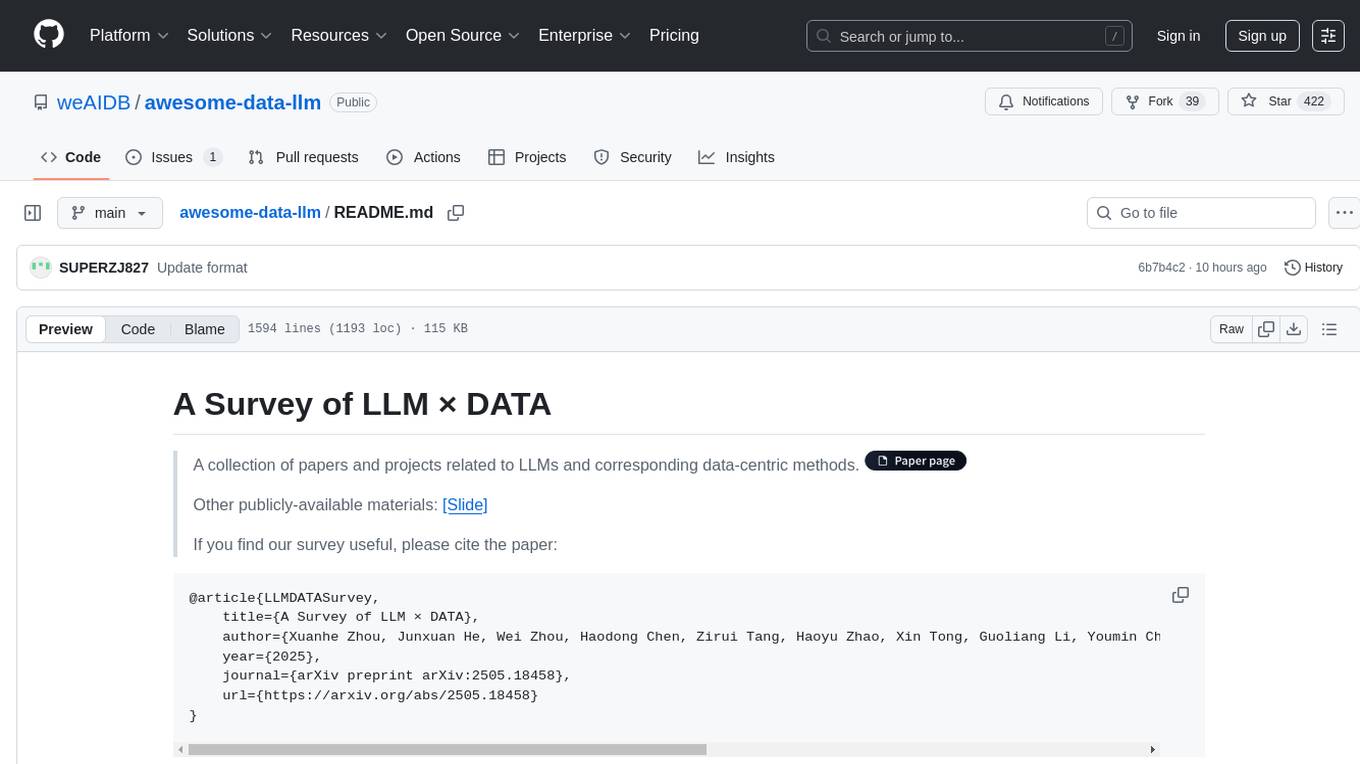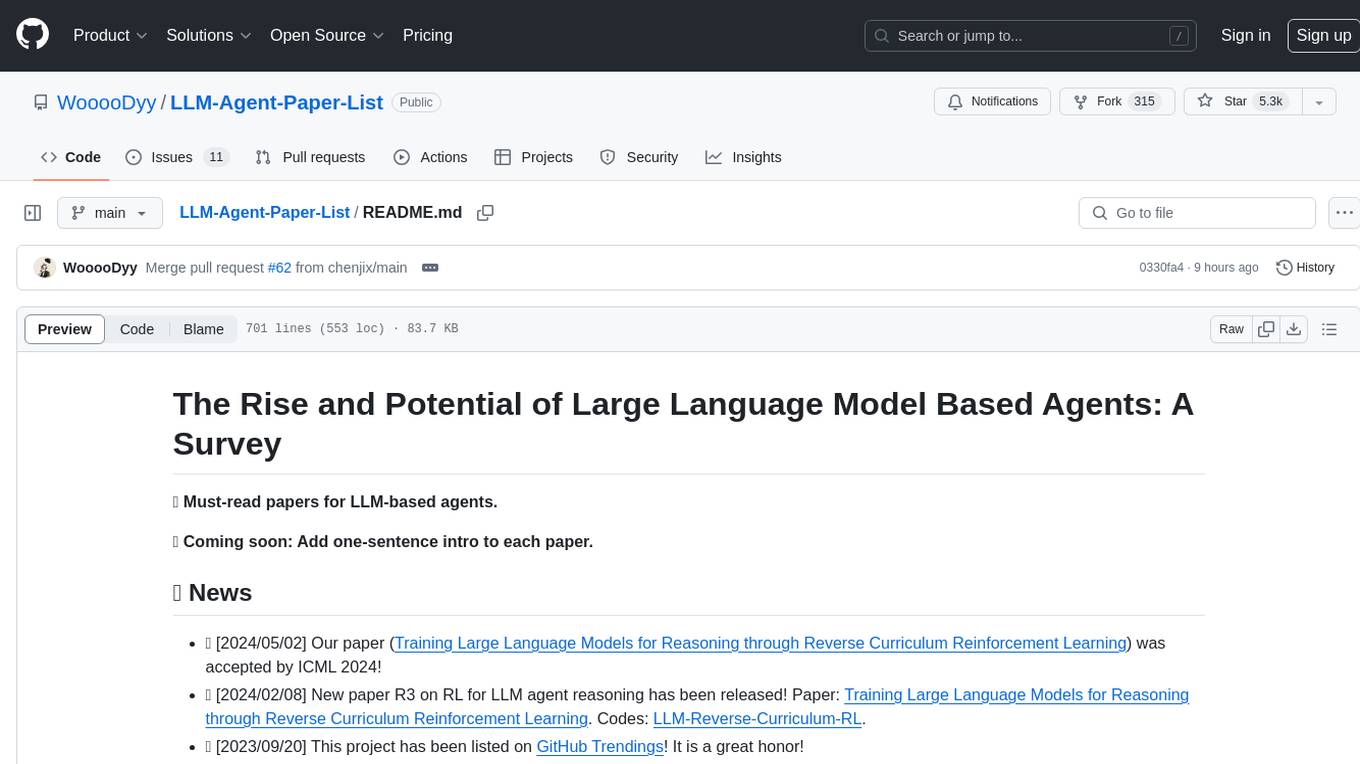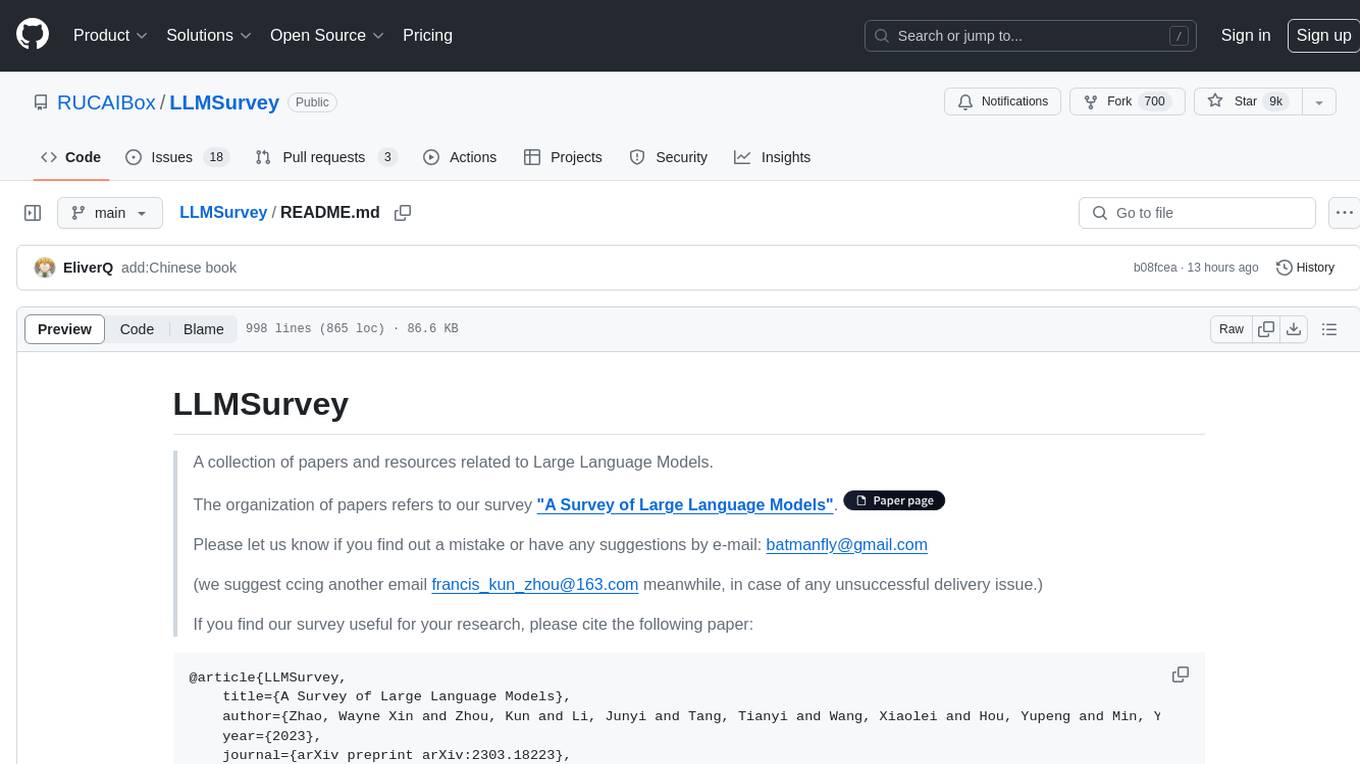
awesome-deeplogic
A collection of papers of neural-symbolic AI (mainly focus on NLP applications)
Stars: 214
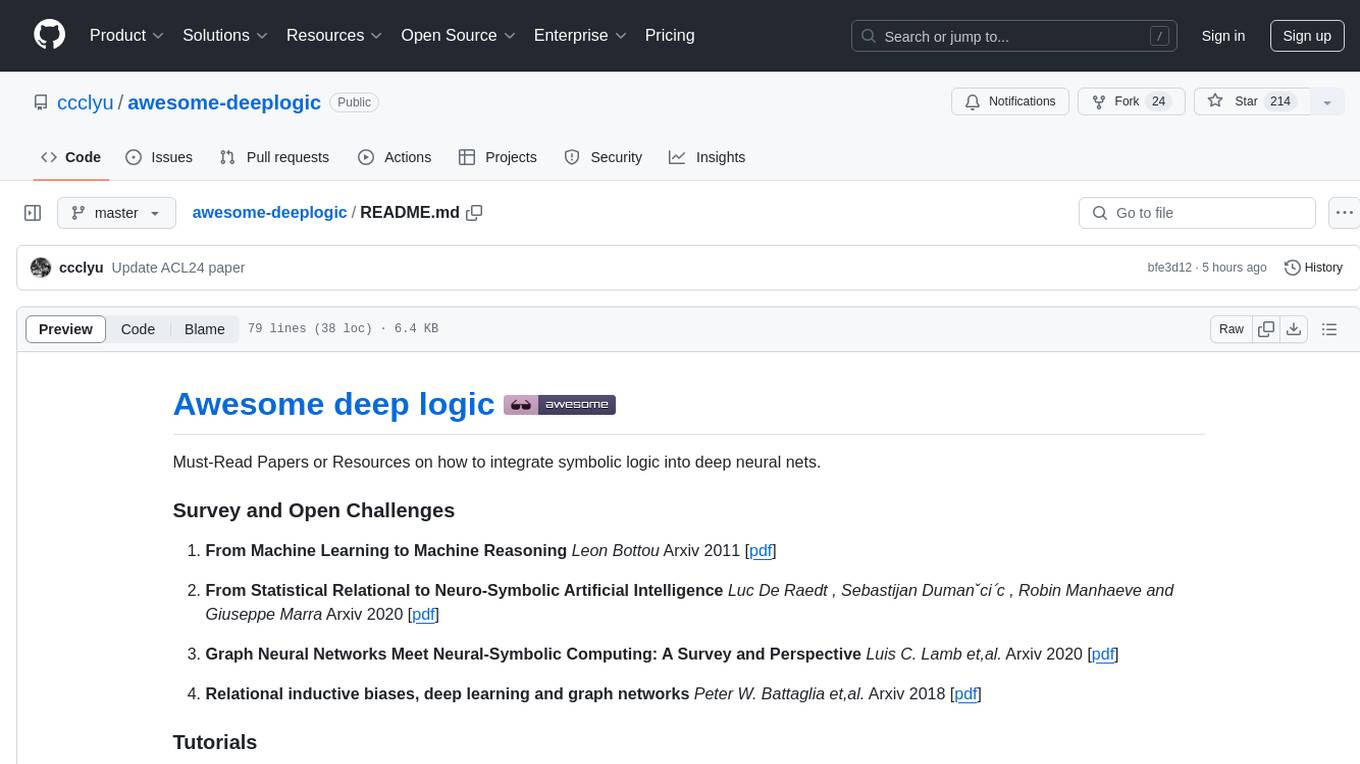
Awesome deep logic is a curated list of papers and resources focusing on integrating symbolic logic into deep neural networks. It includes surveys, tutorials, and research papers that explore the intersection of logic and deep learning. The repository aims to provide valuable insights and knowledge on how logic can be used to enhance reasoning, knowledge regularization, weak supervision, and explainability in neural networks.
README:
Must-Read Papers or Resources on how to integrate symbolic logic into deep neural nets.
-
From Machine Learning to Machine Reasoning Leon Bottou Arxiv 2011 [pdf]
-
From Statistical Relational to Neuro-Symbolic Artificial Intelligence Luc De Raedt , Sebastijan Dumanˇci ́c , Robin Manhaeve and Giuseppe Marra Arxiv 2020 [pdf]
-
Graph Neural Networks Meet Neural-Symbolic Computing: A Survey and Perspective Luis C. Lamb et,al. Arxiv 2020 [pdf]
-
Relational inductive biases, deep learning and graph networks Peter W. Battaglia et,al. Arxiv 2018 [pdf]
- Neuro-Symbolic Methods For Language And Vision AAAI 2022 [link]
-
Enhancing Zero-Shot Chain-of-Thought Reasoning in Large Language Models through Logic Xufeng Zhao, Mengdi Li, Wenhao Lu, Cornelius Weber, Jae Hee Lee, Kun Chu, Stefan Wermter. COLING 2024 [pdf] [code]
-
Clinical Temporal Relation Extraction with Probabilistic Soft Logic Regularization and Global Inference. Yichao Zhou, Yu Yan, Rujun Han, J. Harry Caufield,Kai-Wei Chang, Yizhou Sun, Peipei Ping and Wei Wang. AAAI 2021 [pdf] [code]
-
Integrating Deep Learning with Logic Fusion for Information Extraction. Wenya Wang, Sinno Jialin Pan. AAAI 2020 [pdf] [code]
-
Logic-guided Data Augmentation and Reguralization for Consistent Question Answering. Akari Asai, Hannaneh Hajishirzi. ACL 2020 [pdf] [code]
-
Structured Tuning for Semantic Role Labeling. Tao Li, Parth Anand Jawale, Martha Palmer, Vivek Srikumar ACL 2020 [pdf] [code]
-
Leveraging Declarative Knowledge in Text and First-Order Logic for Fine-Grained Propaganda Detection. Ruize Wang, Duyu Tang, et,al EMNLP 2020 [pdf]
-
Joint Constrained Learning for Event-Event Relation Extraction Haoyu Wang, Muhao Chen, Hongming Zhang, Dan Roth EMNLP 2020 [pdf]
-
A Logic-Driven Framework for Consistency of Neural Models. Tao Li, Vivek Gupta, Maitrey Mehta, Vivek Srikumar EMNLP-IJCNLP 2019 [pdf] [code]
-
Adversarially regularising neural NLI models to integrate logical background knowledge. Pasquale Minervini, Sebastian Riedel. CoNLL 2018 [pdf] [code]
-
Lifted Rule Injection for Relation Embeddings. Thomas Demeester, Tim Rocktäschel, Sebastian Riedel EMNLP 2016 [pdf]
-
Neuro-symbolic Natural Logic with Introspective Revision for Natural Language Inference Yufei Feng, Xiaoyu Yang, Xiaodan Zhu, Michael Greenspan TACL 2022 [pdf]
-
LNN-EL: A Neuro-Symbolic Approach to Short-text Entity Linking Hang Jiang et,al ACL 2021 [pdf]
-
Weakly Supervised Named Entity Tagging with Learnable Logical Rules. Jiacheng Li, Haibo Ding, Jingbo Shang, Julian McAuley, Zhe Feng ACL-IJCNLP 2021 [pdf] [code]
-
Learning Language Representations with Logical Inductive Bias. Jianshu Chen ICLR 2023 pdf]
-
Modeling Content and Context with Deep Relational Learning Maria Leonor Pacheco and Dan Goldwasser TACL 2021 [pdf] [code]
-
Logical Neural Networks Ryan Riegel et,al (IBM Research) Arxiv 2020 [pdf]
-
LogicBench: Towards Systematic Evaluation of Logical Reasoning Ability of Large Language Models, Mihir Parmar et,al ACL 2024 [pdf]
-
Transformers Implement First-Order Logic with Majority Quantifiers William Merrill, Ashish Sabharwal Arxiv 2022 [pdf]
-
What Can Neural Networks Reson About? Keyulu Xu, Jingling Li et,al ICLR 2020 [pdf] [code]
-
Relational Reasoning and Generalization using Non-symbolic Neural Networks Arxiv 2020 [pdf]
-
Complex Query Answering With Neural Link Predictors Erik Arakelyan, Daniel Daza, Pasquale Minervini & Michael Cochez ICLR 2021 [pdf] [code]
-
Faithfully Explainable Recommendation via Neural Logic Reasoning Yaxin Zhu, Yikun Xian, Zuohui Fu, Gerard de Melo, Yongfeng Zhang NAACL [pdf] [code]
-
Correlating neural and symbolic representations of language. Grzegorz Chrupała, Afra Alishahi. ACL 2019 [pdf][code]
-
Representing Meaning with a Combination of Logical and Distributional Models. I. Beltagy, Stephen Roller, Pengxiang Cheng, Katrin Erk, Raymond J. Mooney. Computational Linguistics 2016 [pdf] [code]
For Tasks:
Click tags to check more tools for each tasksFor Jobs:
Alternative AI tools for awesome-deeplogic
Similar Open Source Tools

awesome-deeplogic
Awesome deep logic is a curated list of papers and resources focusing on integrating symbolic logic into deep neural networks. It includes surveys, tutorials, and research papers that explore the intersection of logic and deep learning. The repository aims to provide valuable insights and knowledge on how logic can be used to enhance reasoning, knowledge regularization, weak supervision, and explainability in neural networks.
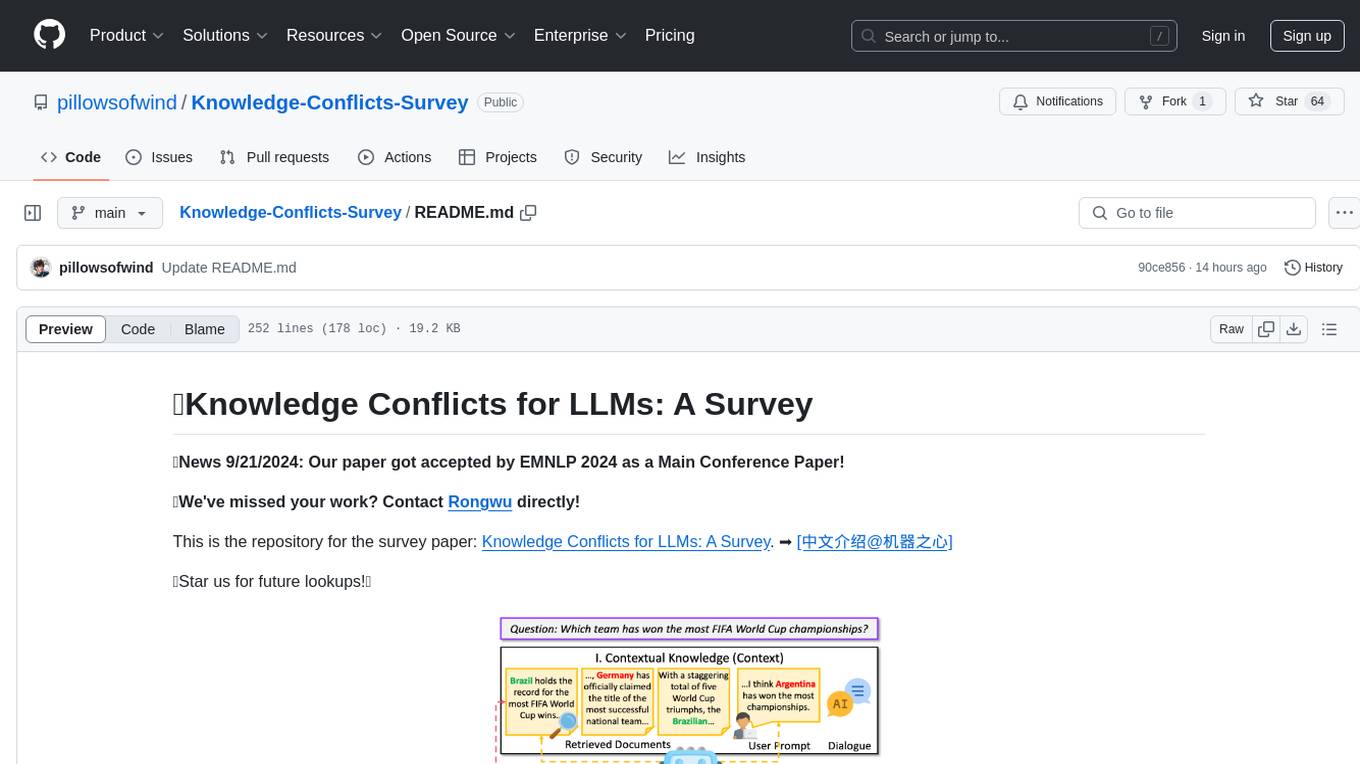
Knowledge-Conflicts-Survey
Knowledge Conflicts for LLMs: A Survey is a repository containing a survey paper that investigates three types of knowledge conflicts: context-memory conflict, inter-context conflict, and intra-memory conflict within Large Language Models (LLMs). The survey reviews the causes, behaviors, and possible solutions to these conflicts, providing a comprehensive analysis of the literature in this area. The repository includes detailed information on the types of conflicts, their causes, behavior analysis, and mitigating solutions, offering insights into how conflicting knowledge affects LLMs and how to address these conflicts.
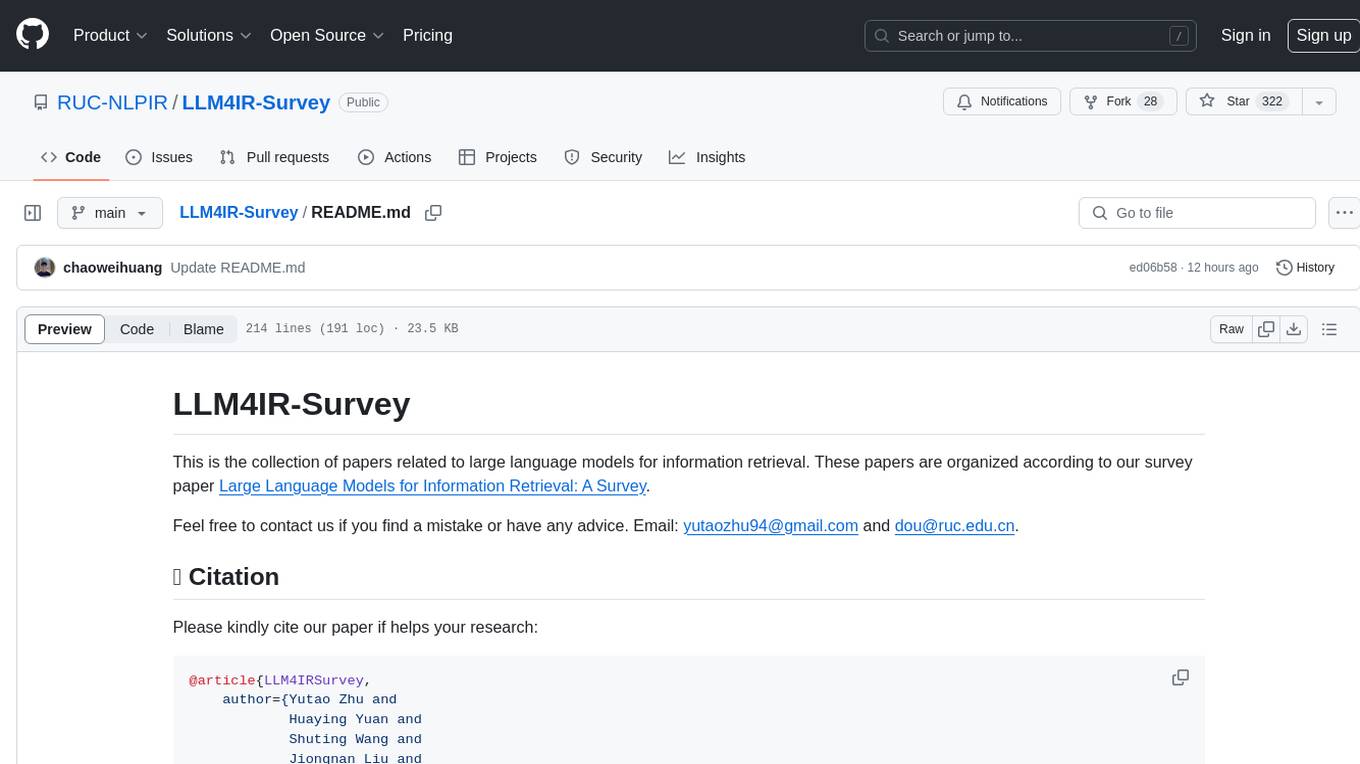
LLM4IR-Survey
LLM4IR-Survey is a collection of papers related to large language models for information retrieval, organized according to the survey paper 'Large Language Models for Information Retrieval: A Survey'. It covers various aspects such as query rewriting, retrievers, rerankers, readers, search agents, and more, providing insights into the integration of large language models with information retrieval systems.
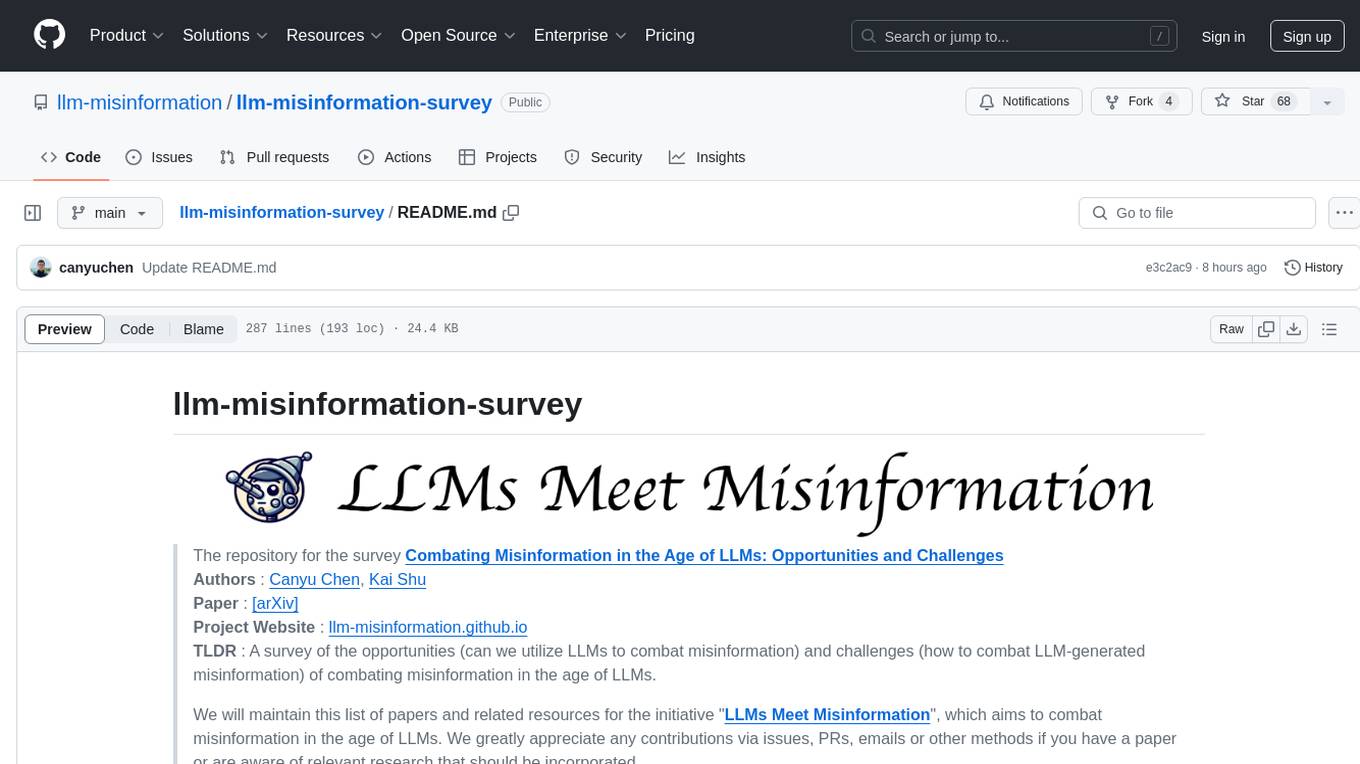
llm-misinformation-survey
The 'llm-misinformation-survey' repository is dedicated to the survey on combating misinformation in the age of Large Language Models (LLMs). It explores the opportunities and challenges of utilizing LLMs to combat misinformation, providing insights into the history of combating misinformation, current efforts, and future outlook. The repository serves as a resource hub for the initiative 'LLMs Meet Misinformation' and welcomes contributions of relevant research papers and resources. The goal is to facilitate interdisciplinary efforts in combating LLM-generated misinformation and promoting the responsible use of LLMs in fighting misinformation.
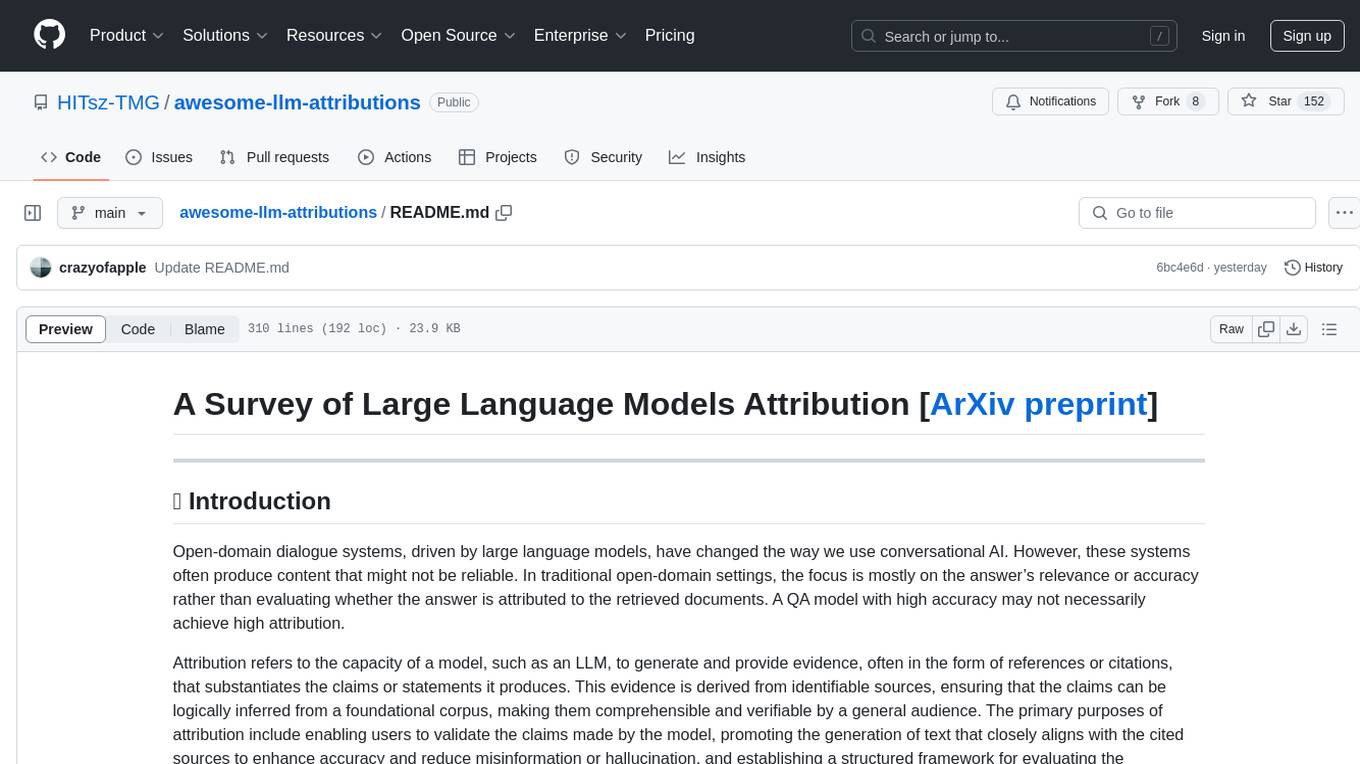
awesome-llm-attributions
This repository focuses on unraveling the sources that large language models tap into for attribution or citation. It delves into the origins of facts, their utilization by the models, the efficacy of attribution methodologies, and challenges tied to ambiguous knowledge reservoirs, biases, and pitfalls of excessive attribution.
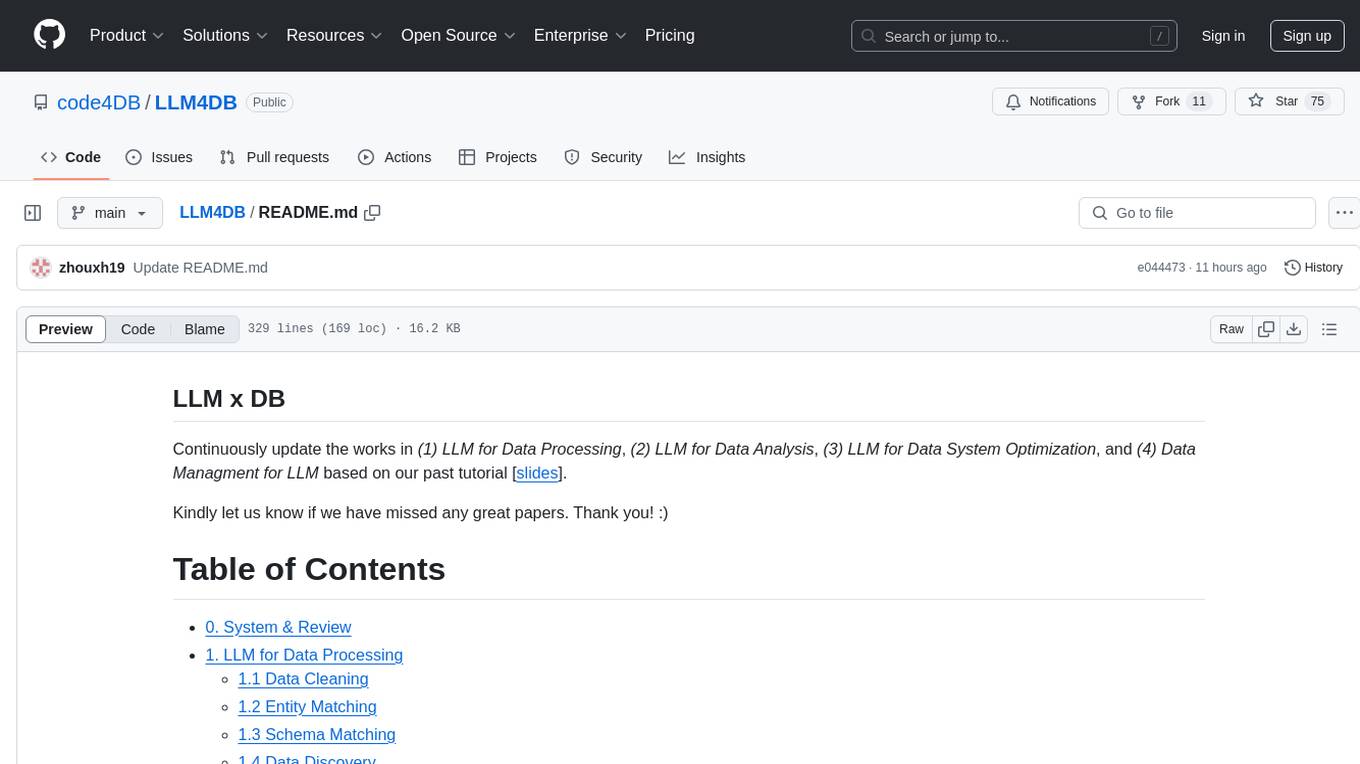
LLM4DB
LLM4DB is a repository focused on the intersection of Large Language Models (LLMs) and Database technologies. It covers various aspects such as data processing, data analysis, database optimization, and data management for LLMs. The repository includes research papers, tools, and techniques related to leveraging LLMs for tasks like data cleaning, entity matching, schema matching, data discovery, NL2SQL, data exploration, data visualization, knob tuning, query optimization, and database diagnosis.

LLM4DB
LLM4DB is a repository focused on the intersection of Large Language Models (LLM) and Database technologies. It covers various aspects such as data processing, data analysis, database optimization, and data management for LLM. The repository includes works on data cleaning, entity matching, schema matching, data discovery, NL2SQL, data exploration, data visualization, configuration tuning, query optimization, and anomaly diagnosis using LLMs. It aims to provide insights and advancements in leveraging LLMs for improving data processing, analysis, and database management tasks.
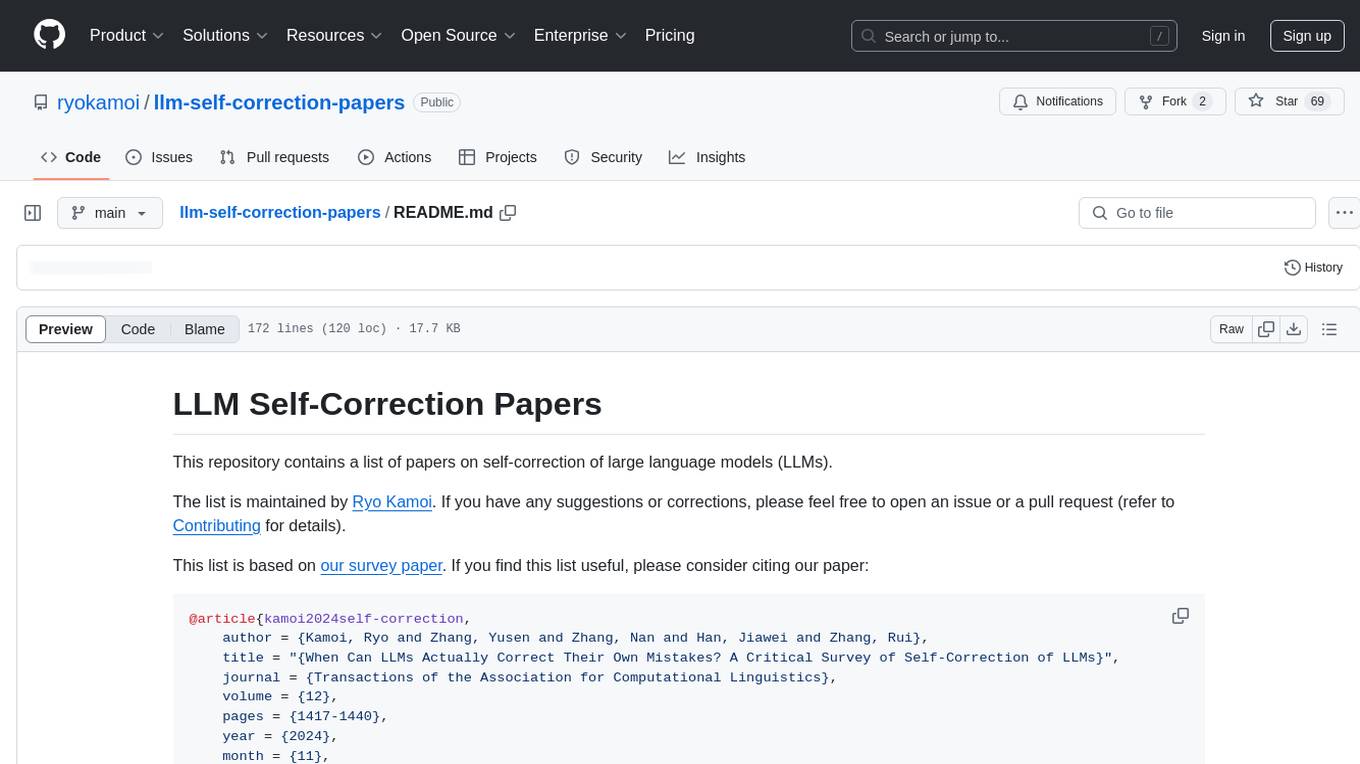
llm-self-correction-papers
This repository contains a curated list of papers focusing on the self-correction of large language models (LLMs) during inference. It covers various frameworks for self-correction, including intrinsic self-correction, self-correction with external tools, self-correction with information retrieval, and self-correction with training designed specifically for self-correction. The list includes survey papers, negative results, and frameworks utilizing reinforcement learning and OpenAI o1-like approaches. Contributions are welcome through pull requests following a specific format.
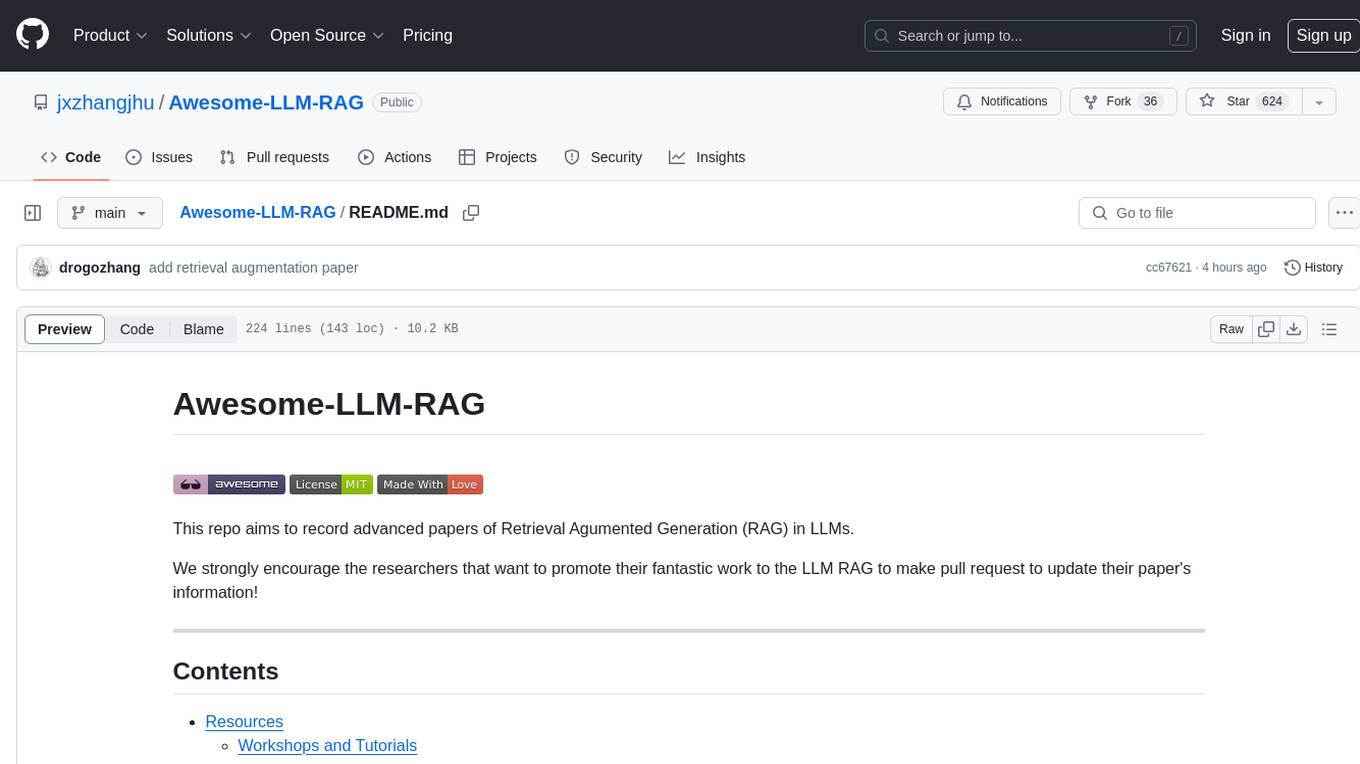
Awesome-LLM-RAG
This repository, Awesome-LLM-RAG, aims to record advanced papers on Retrieval Augmented Generation (RAG) in Large Language Models (LLMs). It serves as a resource hub for researchers interested in promoting their work related to LLM RAG by updating paper information through pull requests. The repository covers various topics such as workshops, tutorials, papers, surveys, benchmarks, retrieval-enhanced LLMs, RAG instruction tuning, RAG in-context learning, RAG embeddings, RAG simulators, RAG search, RAG long-text and memory, RAG evaluation, RAG optimization, and RAG applications.
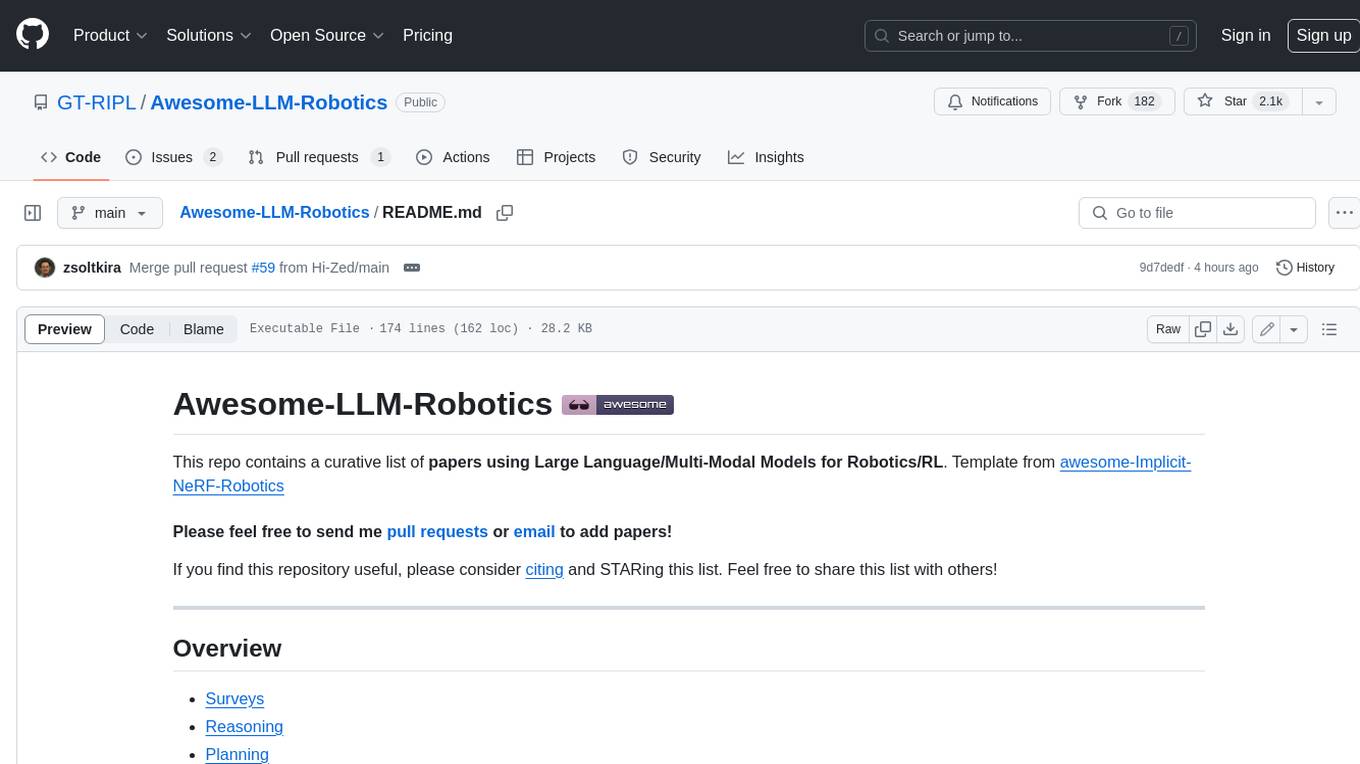
Awesome-LLM-Robotics
This repository contains a curated list of **papers using Large Language/Multi-Modal Models for Robotics/RL**. Template from awesome-Implicit-NeRF-Robotics Please feel free to send me pull requests or email to add papers! If you find this repository useful, please consider citing and STARing this list. Feel free to share this list with others! ## Overview * Surveys * Reasoning * Planning * Manipulation * Instructions and Navigation * Simulation Frameworks * Citation
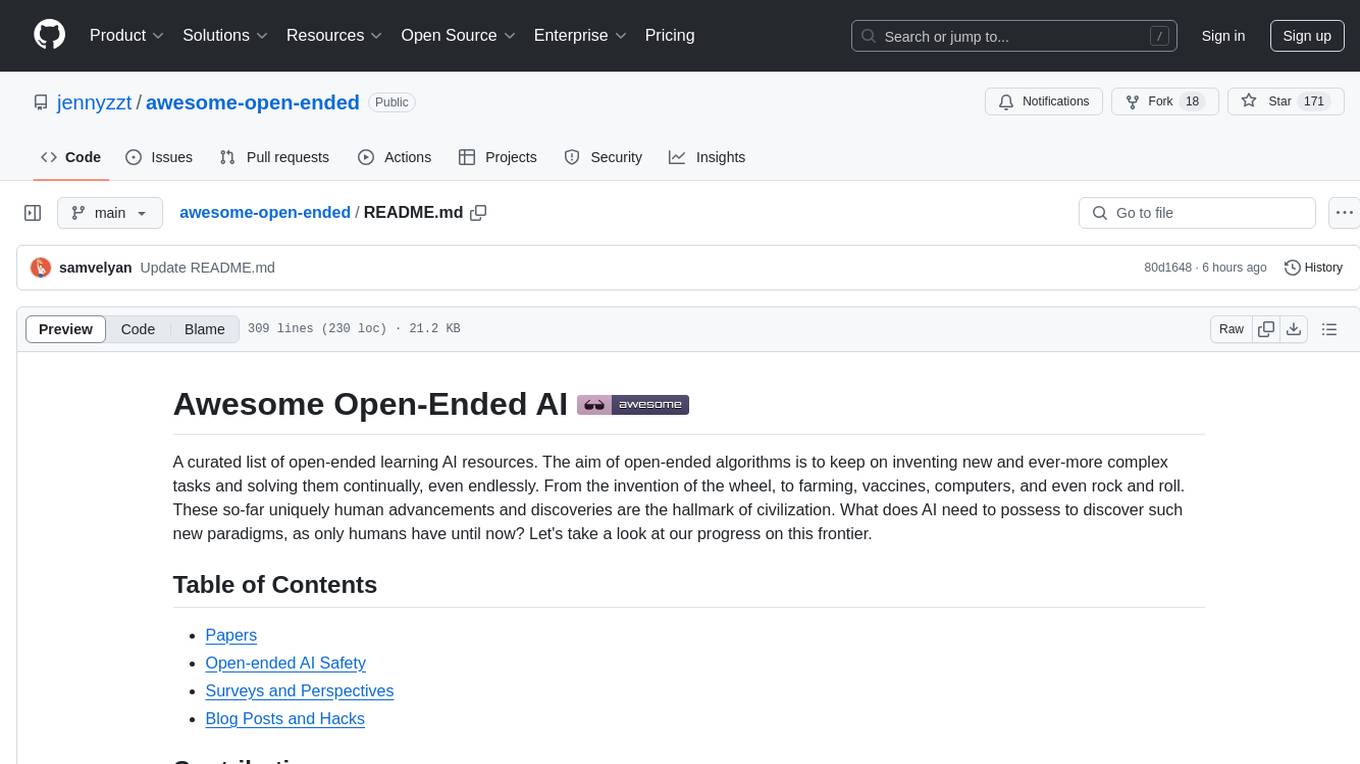
awesome-open-ended
A curated list of open-ended learning AI resources focusing on algorithms that invent new and complex tasks endlessly, inspired by human advancements. The repository includes papers, safety considerations, surveys, perspectives, and blog posts related to open-ended AI research.
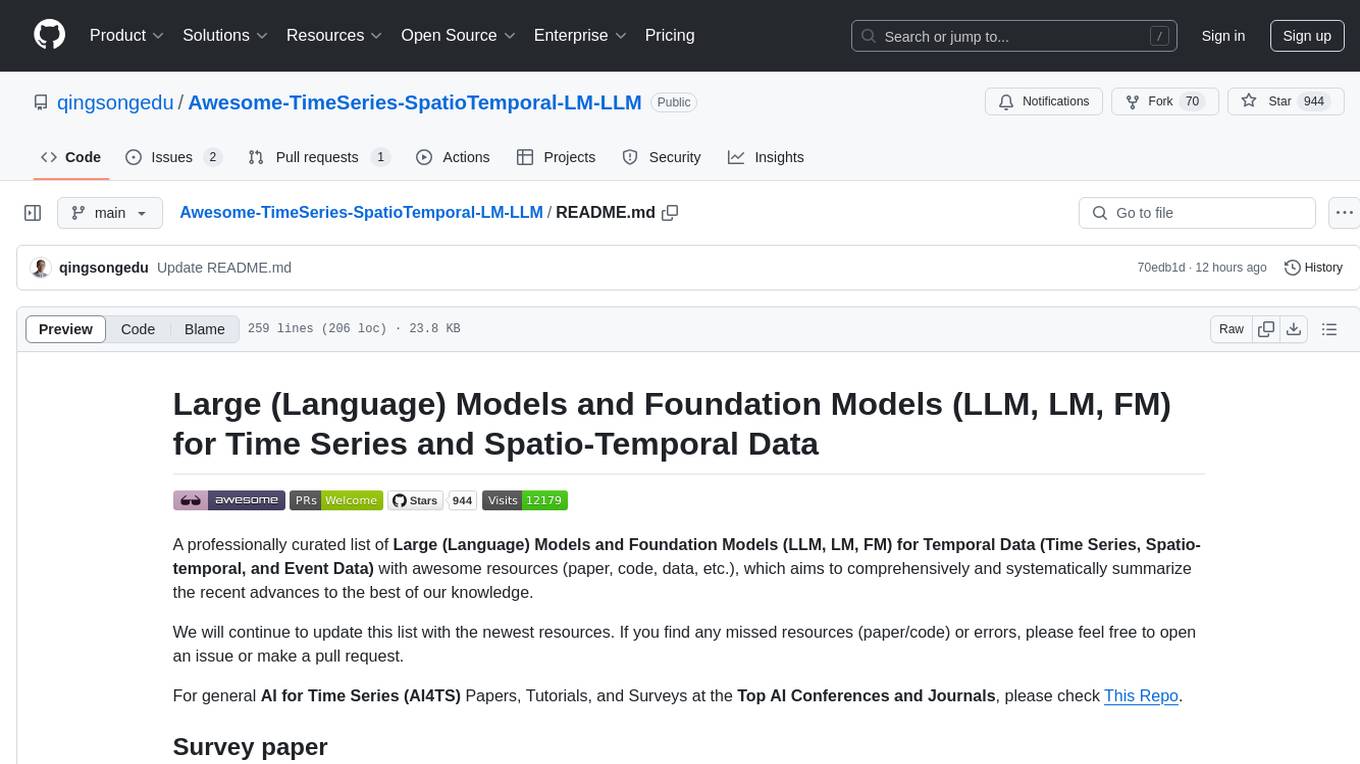
Awesome-TimeSeries-SpatioTemporal-LM-LLM
Awesome-TimeSeries-SpatioTemporal-LM-LLM is a curated list of Large (Language) Models and Foundation Models for Temporal Data, including Time Series, Spatio-temporal, and Event Data. The repository aims to summarize recent advances in Large Models and Foundation Models for Time Series and Spatio-Temporal Data with resources such as papers, code, and data. It covers various applications like General Time Series Analysis, Transportation, Finance, Healthcare, Event Analysis, Climate, Video Data, and more. The repository also includes related resources, surveys, and papers on Large Language Models, Foundation Models, and their applications in AIOps.
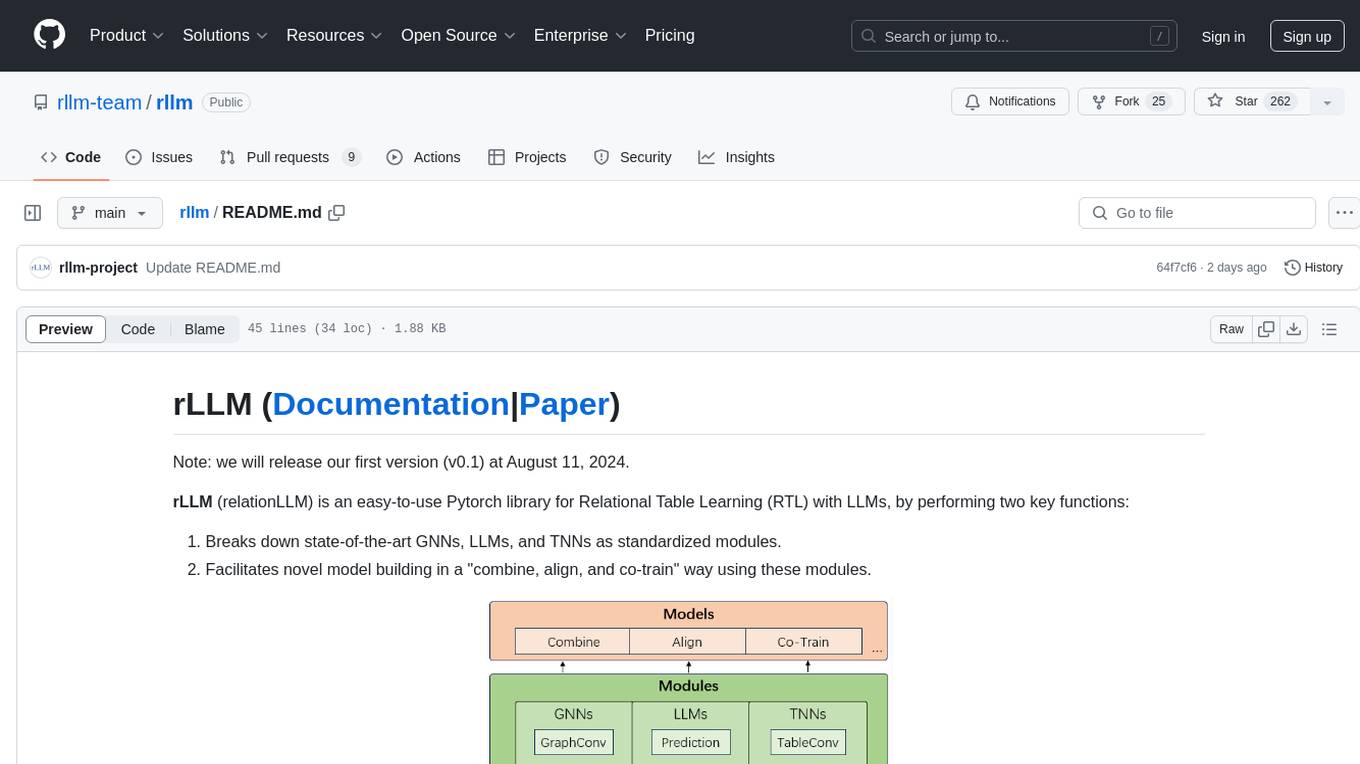
rllm
rLLM (relationLLM) is a Pytorch library for Relational Table Learning (RTL) with LLMs. It breaks down state-of-the-art GNNs, LLMs, and TNNs as standardized modules and facilitates novel model building in a 'combine, align, and co-train' way using these modules. The library is LLM-friendly, processes various graphs as multiple tables linked by foreign keys, introduces new relational table datasets, and is supported by students and teachers from Shanghai Jiao Tong University and Tsinghua University.
For similar tasks

awesome-deeplogic
Awesome deep logic is a curated list of papers and resources focusing on integrating symbolic logic into deep neural networks. It includes surveys, tutorials, and research papers that explore the intersection of logic and deep learning. The repository aims to provide valuable insights and knowledge on how logic can be used to enhance reasoning, knowledge regularization, weak supervision, and explainability in neural networks.
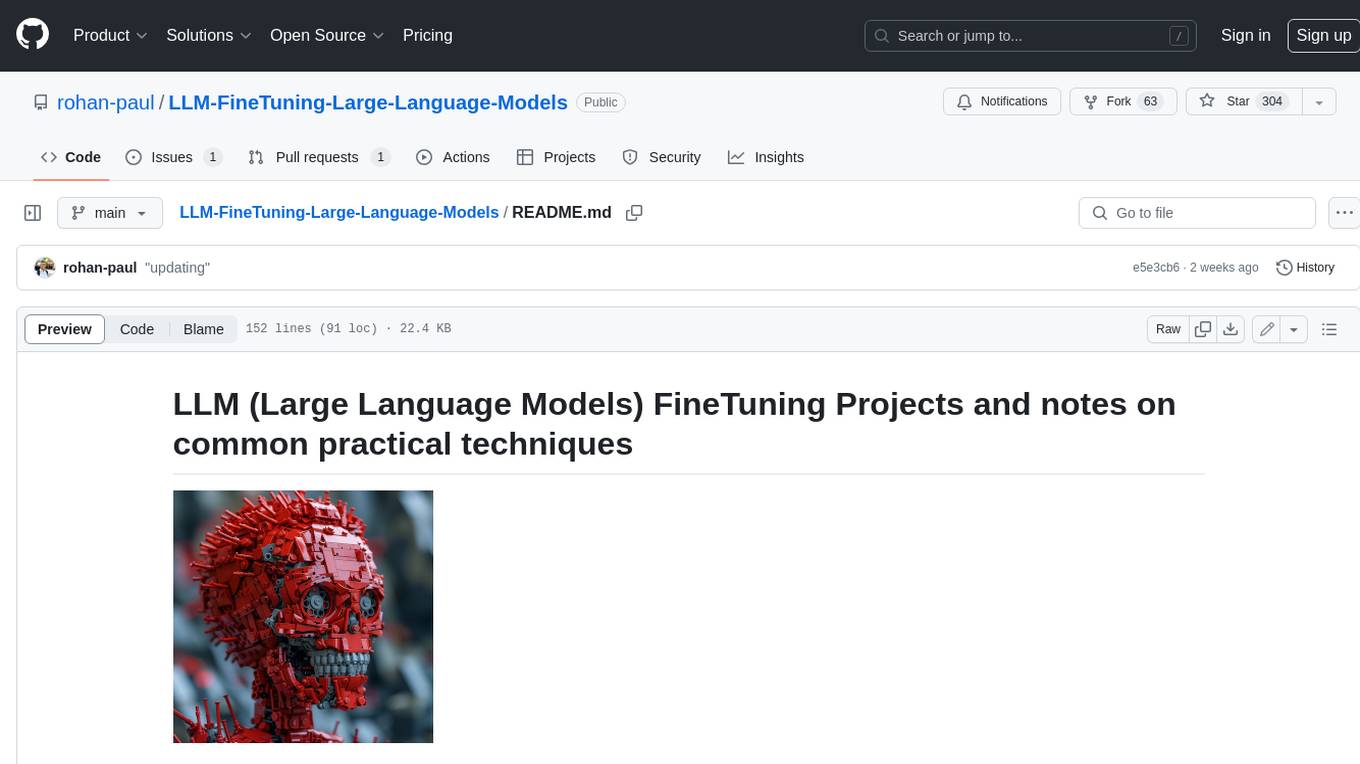
LLM-FineTuning-Large-Language-Models
This repository contains projects and notes on common practical techniques for fine-tuning Large Language Models (LLMs). It includes fine-tuning LLM notebooks, Colab links, LLM techniques and utils, and other smaller language models. The repository also provides links to YouTube videos explaining the concepts and techniques discussed in the notebooks.
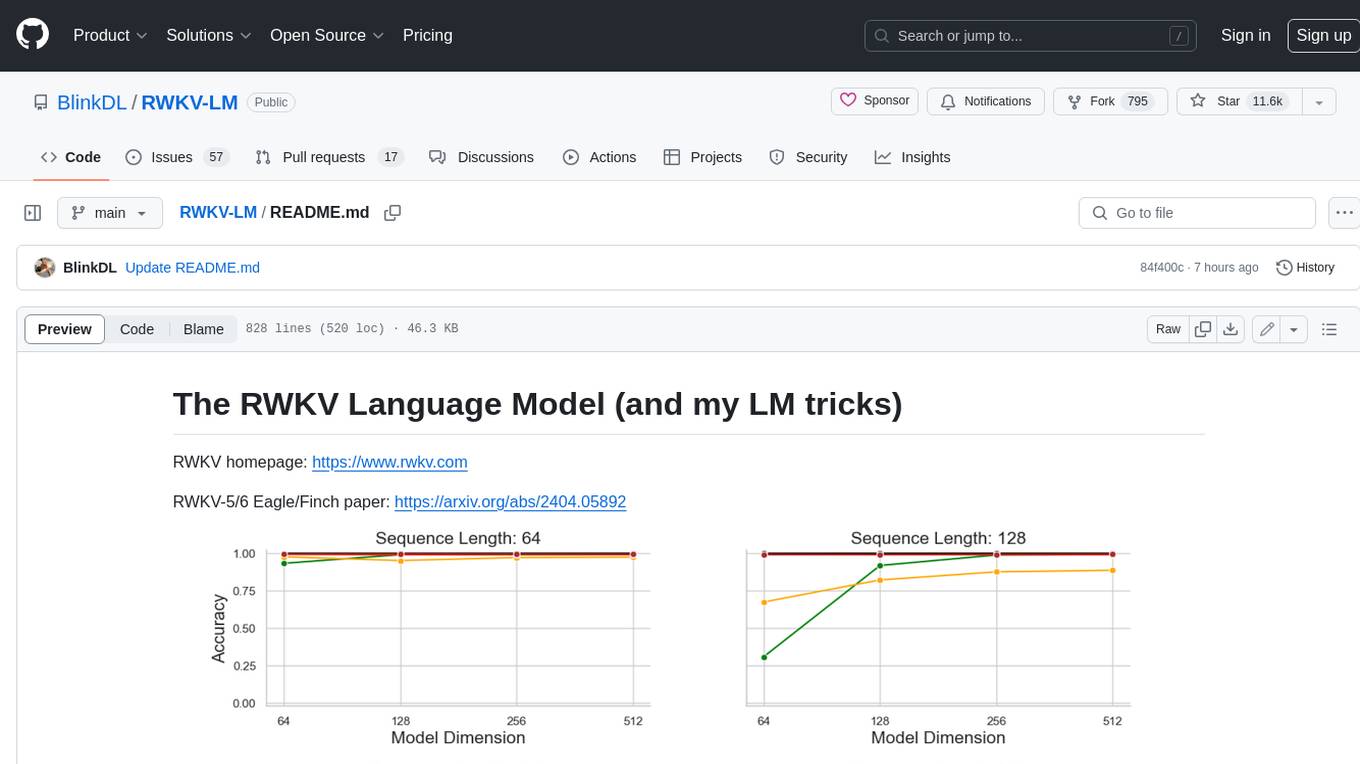
RWKV-LM
RWKV is an RNN with Transformer-level LLM performance, which can also be directly trained like a GPT transformer (parallelizable). And it's 100% attention-free. You only need the hidden state at position t to compute the state at position t+1. You can use the "GPT" mode to quickly compute the hidden state for the "RNN" mode. So it's combining the best of RNN and transformer - **great performance, fast inference, saves VRAM, fast training, "infinite" ctx_len, and free sentence embedding** (using the final hidden state).
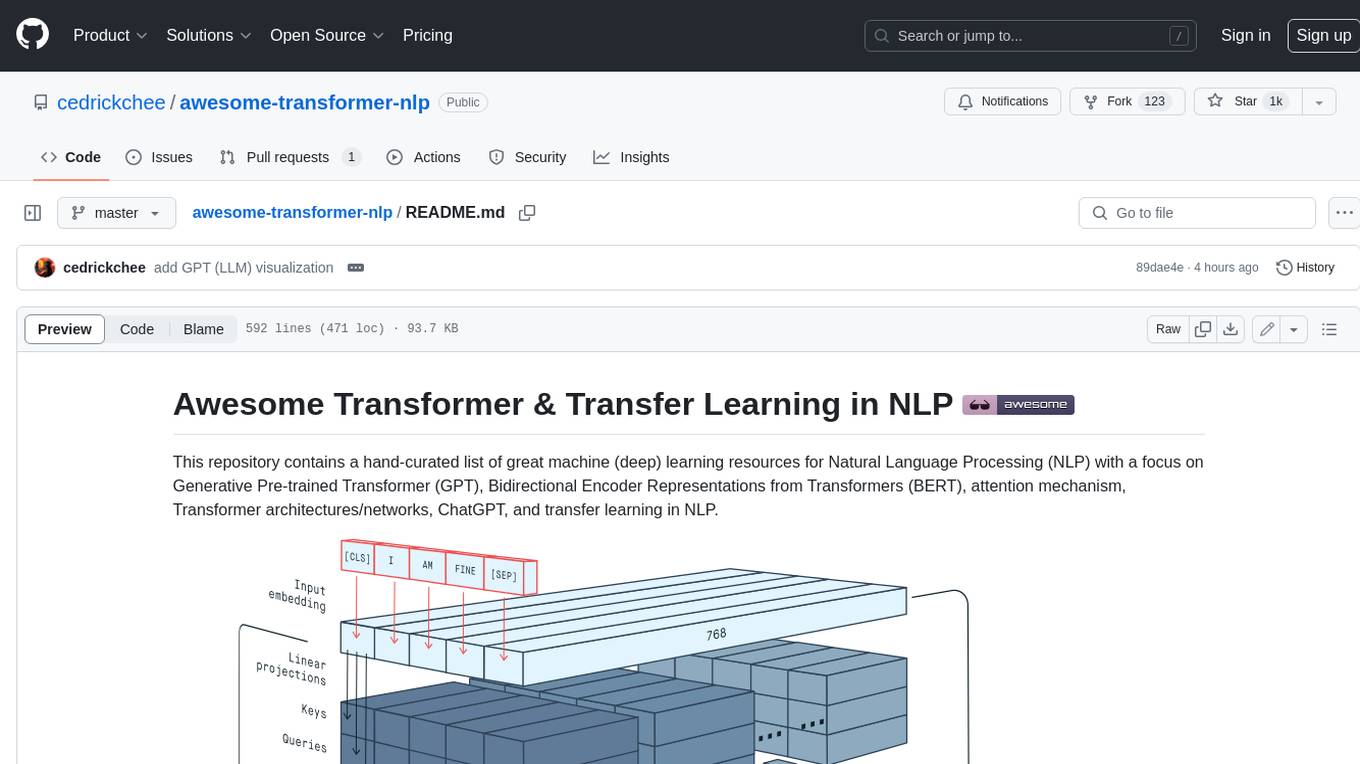
awesome-transformer-nlp
This repository contains a hand-curated list of great machine (deep) learning resources for Natural Language Processing (NLP) with a focus on Generative Pre-trained Transformer (GPT), Bidirectional Encoder Representations from Transformers (BERT), attention mechanism, Transformer architectures/networks, Chatbot, and transfer learning in NLP.
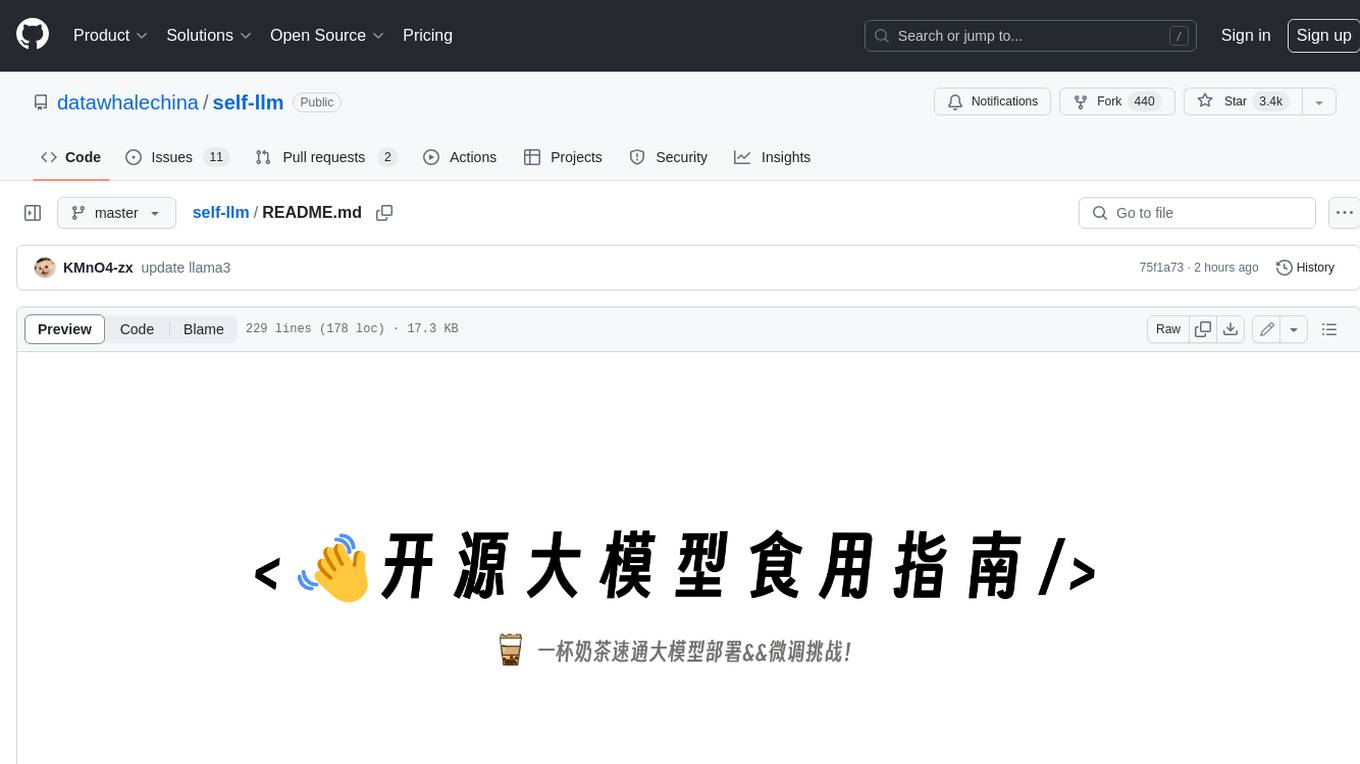
self-llm
This project is a Chinese tutorial for domestic beginners based on the AutoDL platform, providing full-process guidance for various open-source large models, including environment configuration, local deployment, and efficient fine-tuning. It simplifies the deployment, use, and application process of open-source large models, enabling more ordinary students and researchers to better use open-source large models and helping open and free large models integrate into the lives of ordinary learners faster.
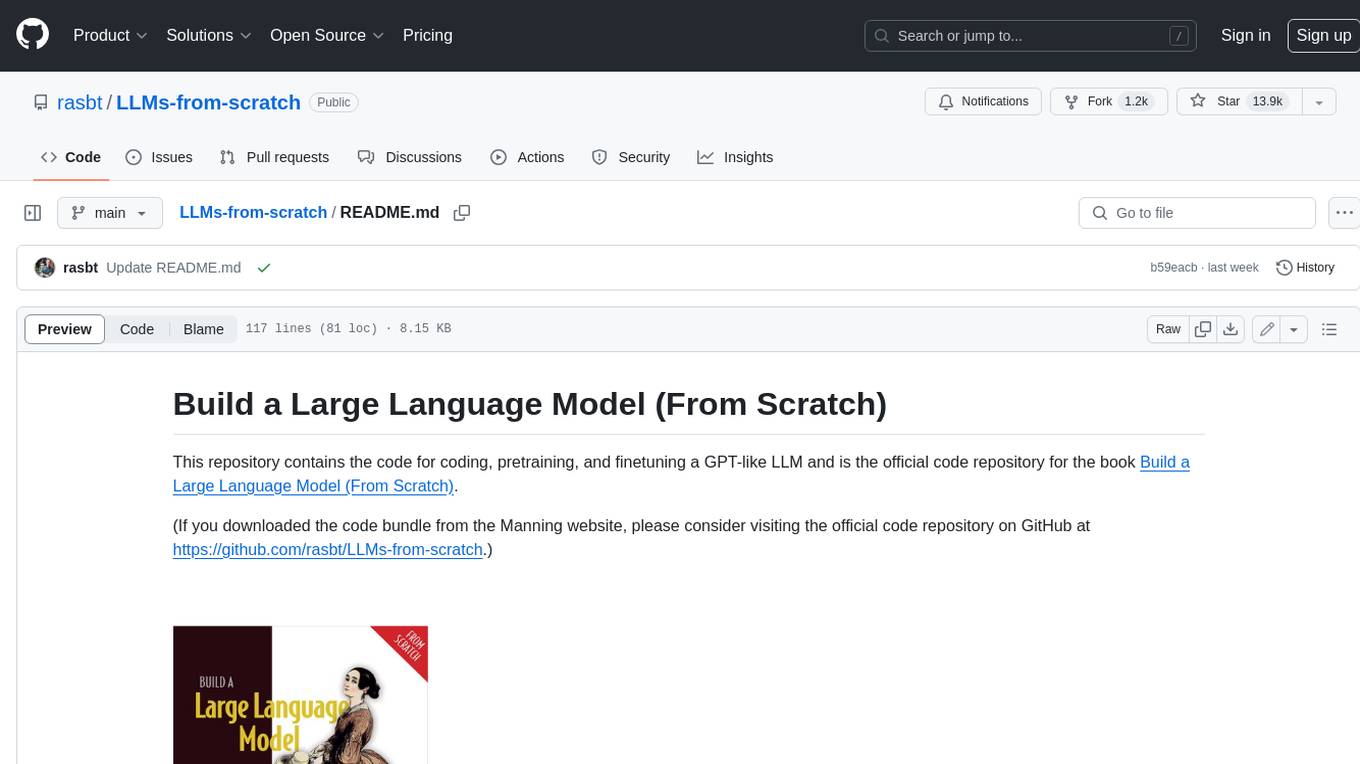
LLMs-from-scratch
This repository contains the code for coding, pretraining, and finetuning a GPT-like LLM and is the official code repository for the book Build a Large Language Model (From Scratch). In _Build a Large Language Model (From Scratch)_, you'll discover how LLMs work from the inside out. In this book, I'll guide you step by step through creating your own LLM, explaining each stage with clear text, diagrams, and examples. The method described in this book for training and developing your own small-but-functional model for educational purposes mirrors the approach used in creating large-scale foundational models such as those behind ChatGPT.
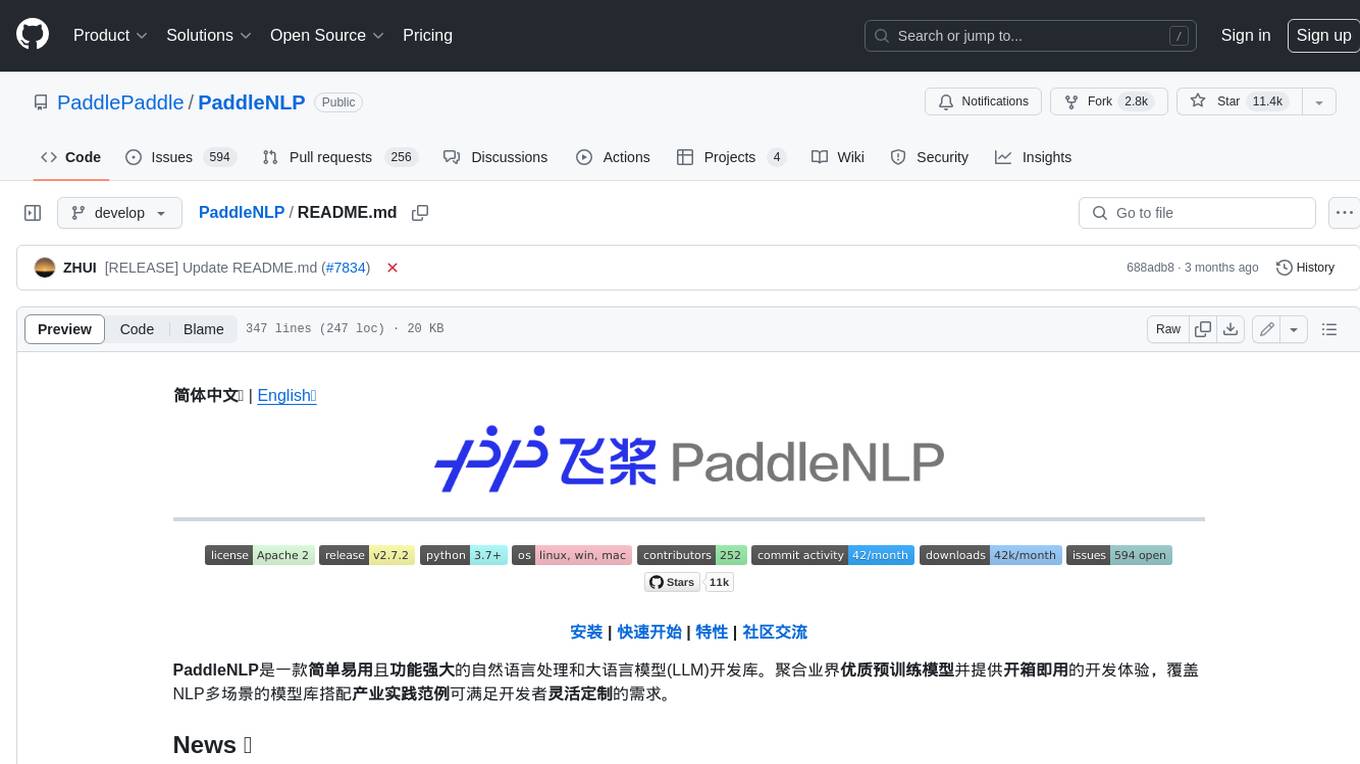
PaddleNLP
PaddleNLP is an easy-to-use and high-performance NLP library. It aggregates high-quality pre-trained models in the industry and provides out-of-the-box development experience, covering a model library for multiple NLP scenarios with industry practice examples to meet developers' flexible customization needs.
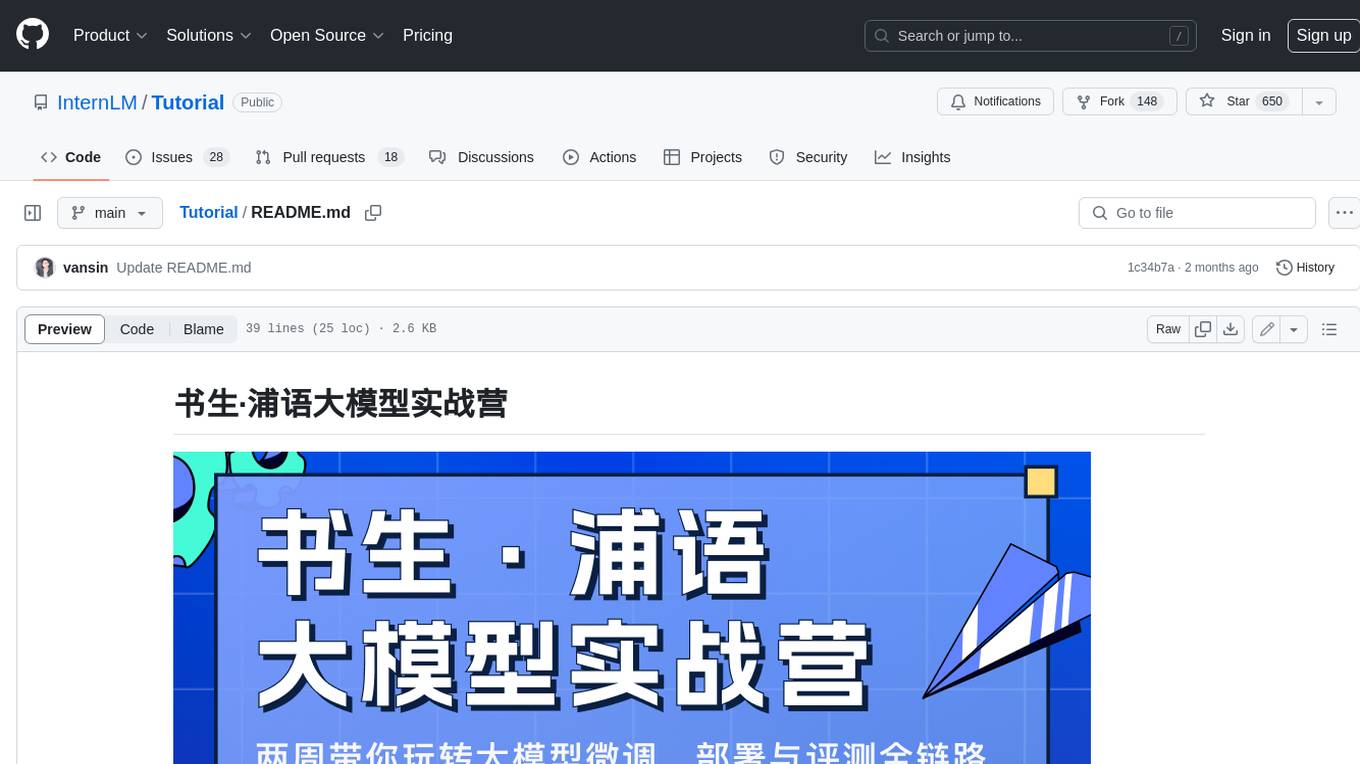
Tutorial
The Bookworm·Puyu large model training camp aims to promote the implementation of large models in more industries and provide developers with a more efficient platform for learning the development and application of large models. Within two weeks, you will learn the entire process of fine-tuning, deploying, and evaluating large models.
For similar jobs
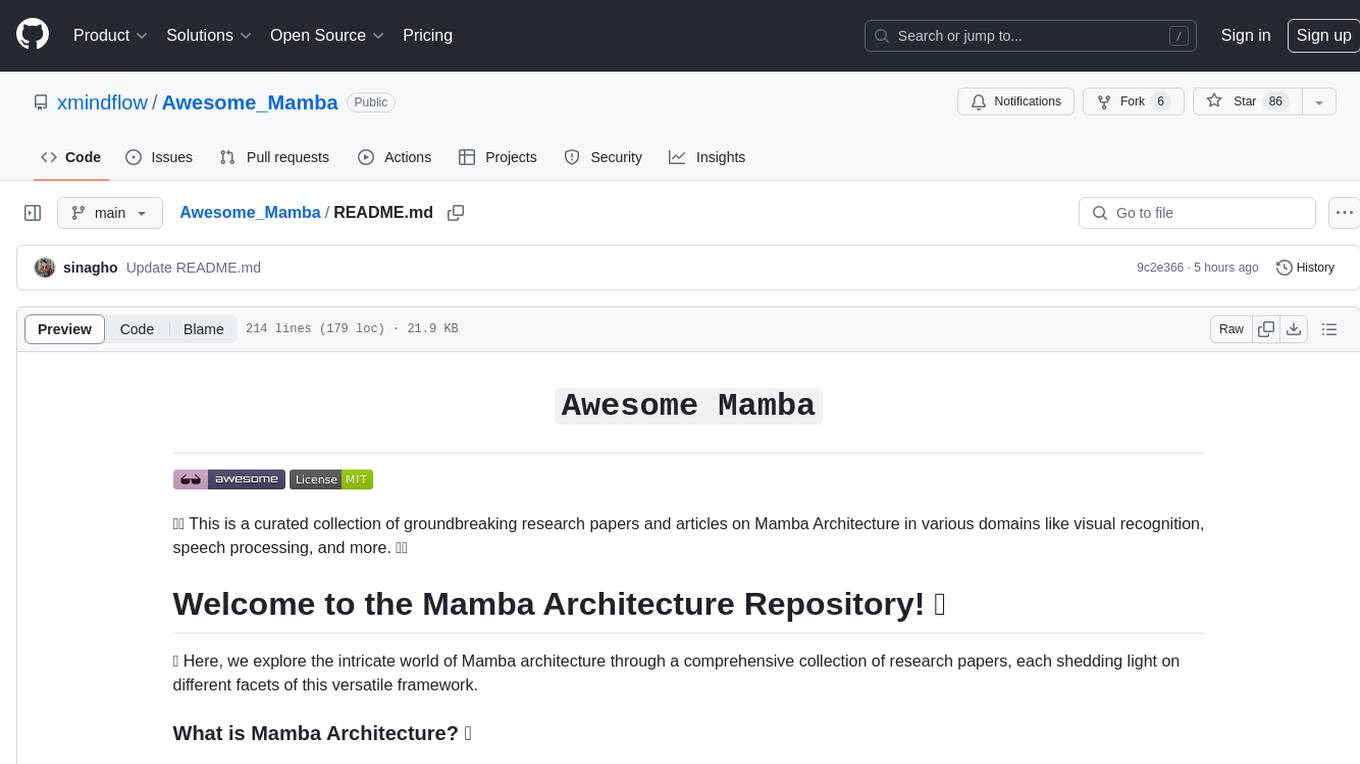
Awesome_Mamba
Awesome Mamba is a curated collection of groundbreaking research papers and articles on Mamba Architecture, a pioneering framework in deep learning known for its selective state spaces and efficiency in processing complex data structures. The repository offers a comprehensive exploration of Mamba architecture through categorized research papers covering various domains like visual recognition, speech processing, remote sensing, video processing, activity recognition, image enhancement, medical imaging, reinforcement learning, natural language processing, 3D recognition, multi-modal understanding, time series analysis, graph neural networks, point cloud analysis, and tabular data handling.
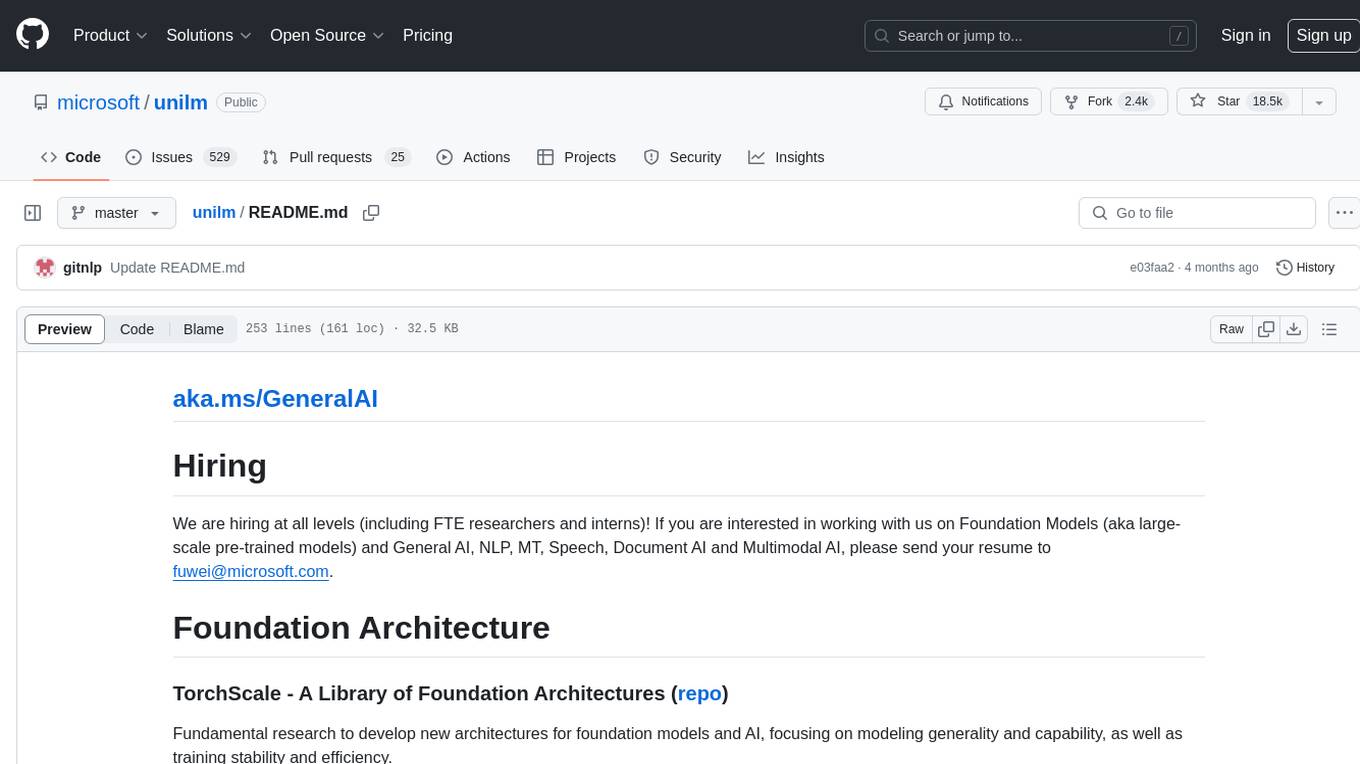
unilm
The 'unilm' repository is a collection of tools, models, and architectures for Foundation Models and General AI, focusing on tasks such as NLP, MT, Speech, Document AI, and Multimodal AI. It includes various pre-trained models, such as UniLM, InfoXLM, DeltaLM, MiniLM, AdaLM, BEiT, LayoutLM, WavLM, VALL-E, and more, designed for tasks like language understanding, generation, translation, vision, speech, and multimodal processing. The repository also features toolkits like s2s-ft for sequence-to-sequence fine-tuning and Aggressive Decoding for efficient sequence-to-sequence decoding. Additionally, it offers applications like TrOCR for OCR, LayoutReader for reading order detection, and XLM-T for multilingual NMT.
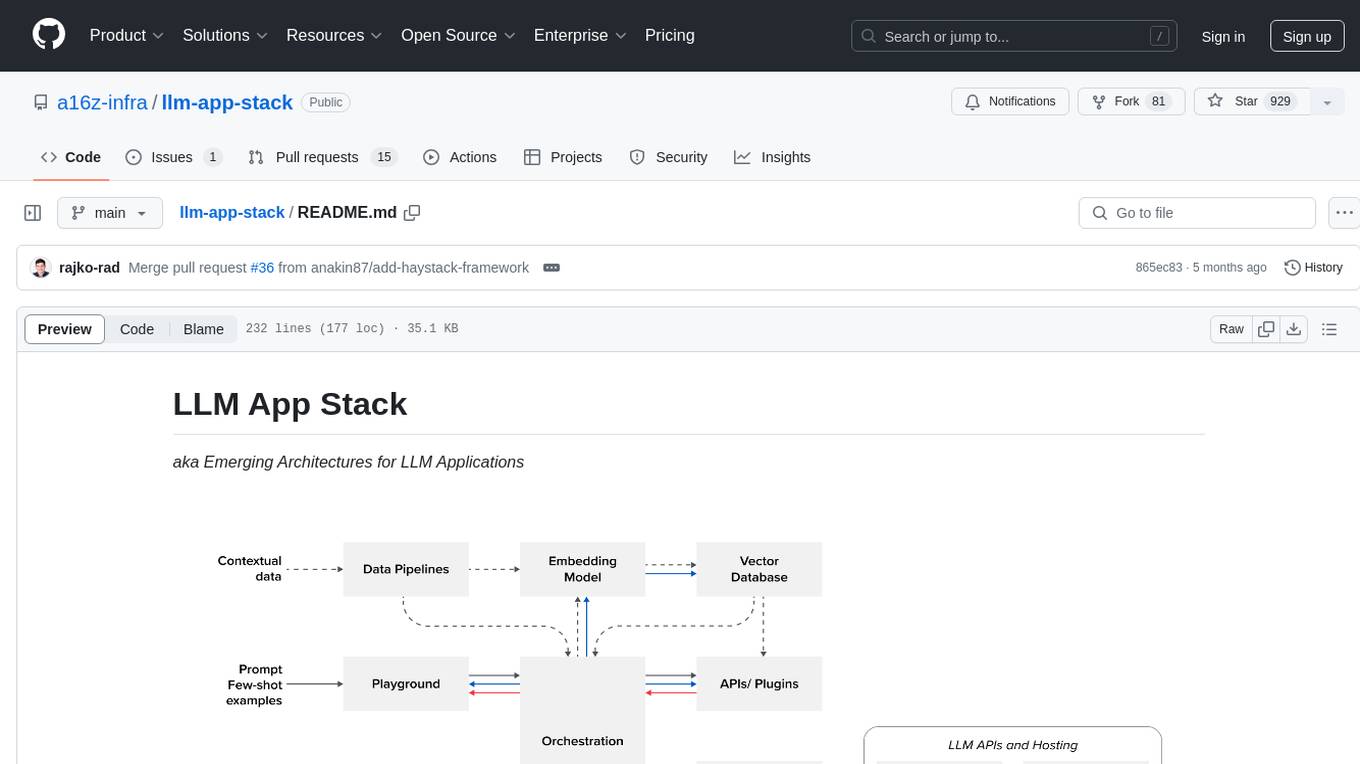
llm-app-stack
LLM App Stack, also known as Emerging Architectures for LLM Applications, is a comprehensive list of available tools, projects, and vendors at each layer of the LLM app stack. It covers various categories such as Data Pipelines, Embedding Models, Vector Databases, Playgrounds, Orchestrators, APIs/Plugins, LLM Caches, Logging/Monitoring/Eval, Validators, LLM APIs (proprietary and open source), App Hosting Platforms, Cloud Providers, and Opinionated Clouds. The repository aims to provide a detailed overview of tools and projects for building, deploying, and maintaining enterprise data solutions, AI models, and applications.

awesome-deeplogic
Awesome deep logic is a curated list of papers and resources focusing on integrating symbolic logic into deep neural networks. It includes surveys, tutorials, and research papers that explore the intersection of logic and deep learning. The repository aims to provide valuable insights and knowledge on how logic can be used to enhance reasoning, knowledge regularization, weak supervision, and explainability in neural networks.
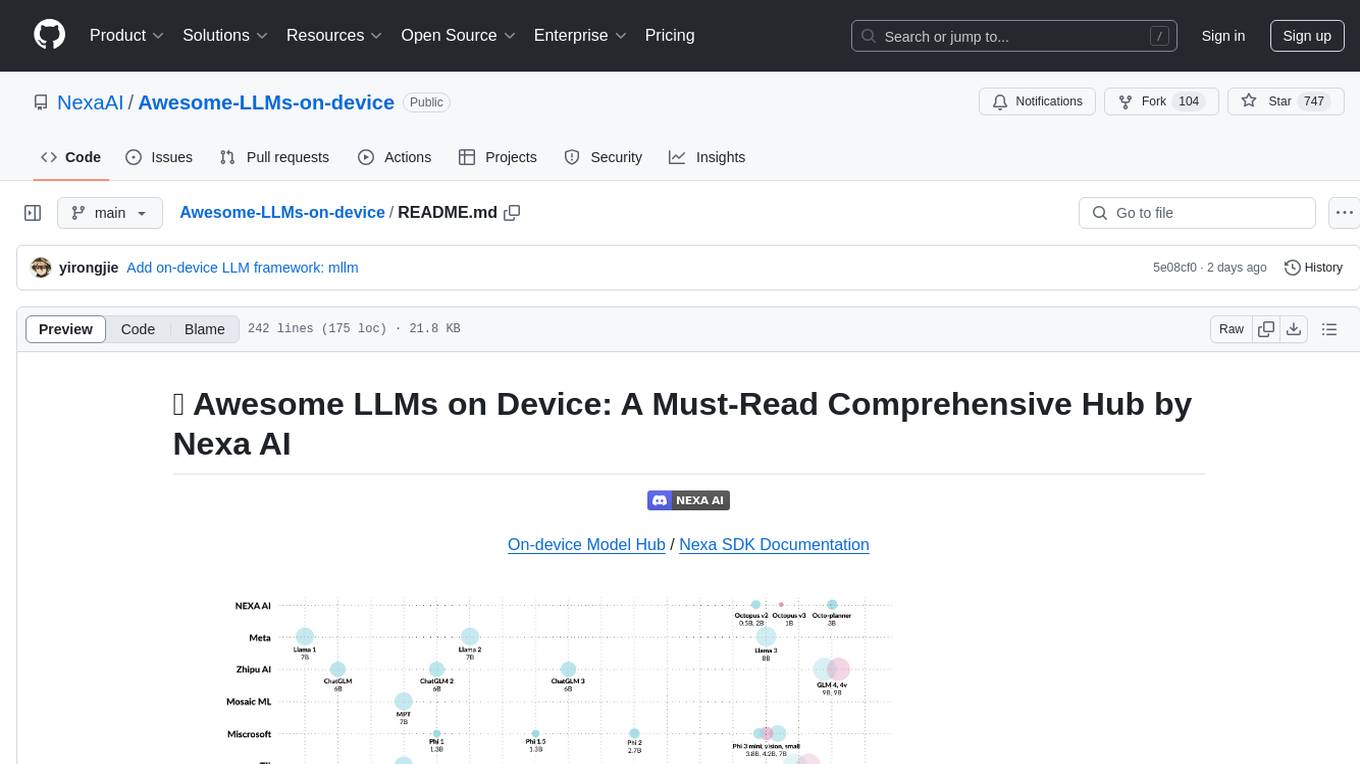
Awesome-LLMs-on-device
Welcome to the ultimate hub for on-device Large Language Models (LLMs)! This repository is your go-to resource for all things related to LLMs designed for on-device deployment. Whether you're a seasoned researcher, an innovative developer, or an enthusiastic learner, this comprehensive collection of cutting-edge knowledge is your gateway to understanding, leveraging, and contributing to the exciting world of on-device LLMs.
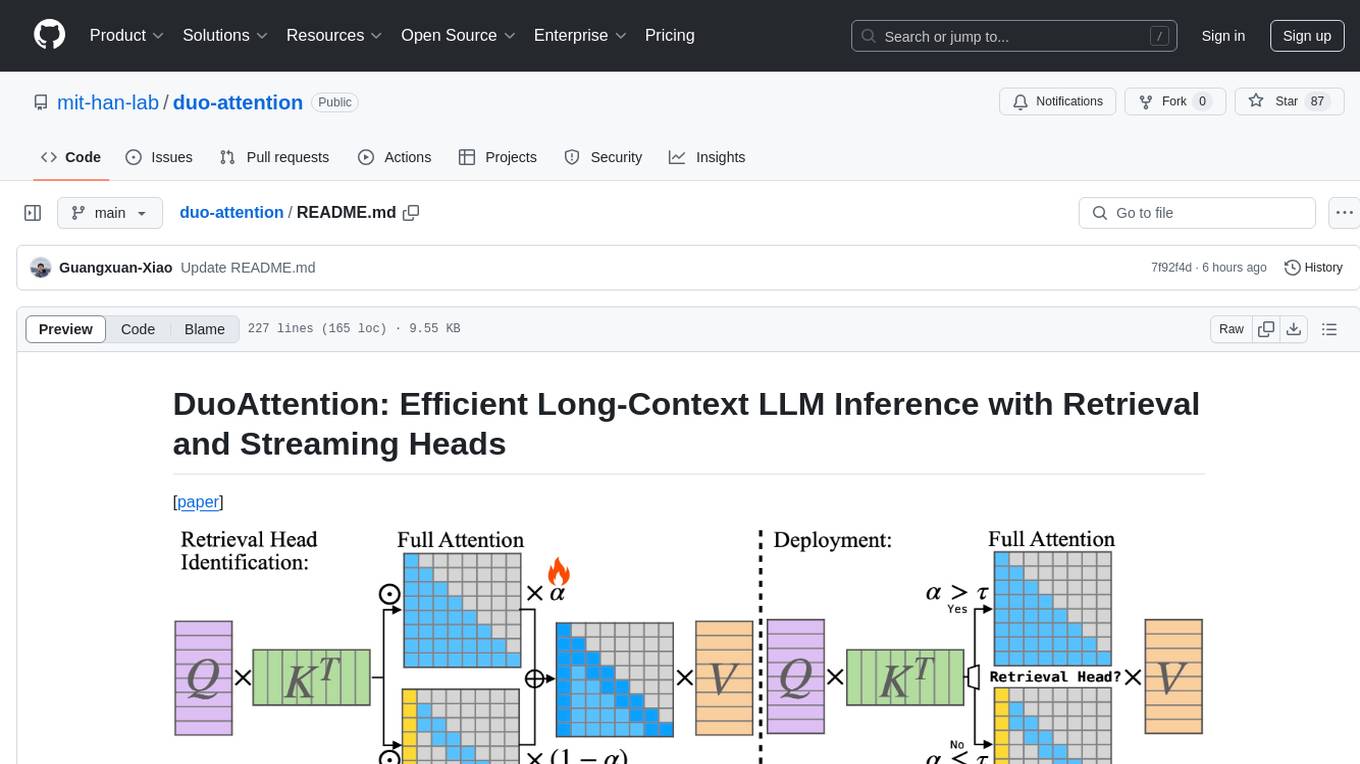
duo-attention
DuoAttention is a framework designed to optimize long-context large language models (LLMs) by reducing memory and latency during inference without compromising their long-context abilities. It introduces a concept of Retrieval Heads and Streaming Heads to efficiently manage attention across tokens. By applying a full Key and Value (KV) cache to retrieval heads and a lightweight, constant-length KV cache to streaming heads, DuoAttention achieves significant reductions in memory usage and decoding time for LLMs. The framework uses an optimization-based algorithm with synthetic data to accurately identify retrieval heads, enabling efficient inference with minimal accuracy loss compared to full attention. DuoAttention also supports quantization techniques for further memory optimization, allowing for decoding of up to 3.3 million tokens on a single GPU.
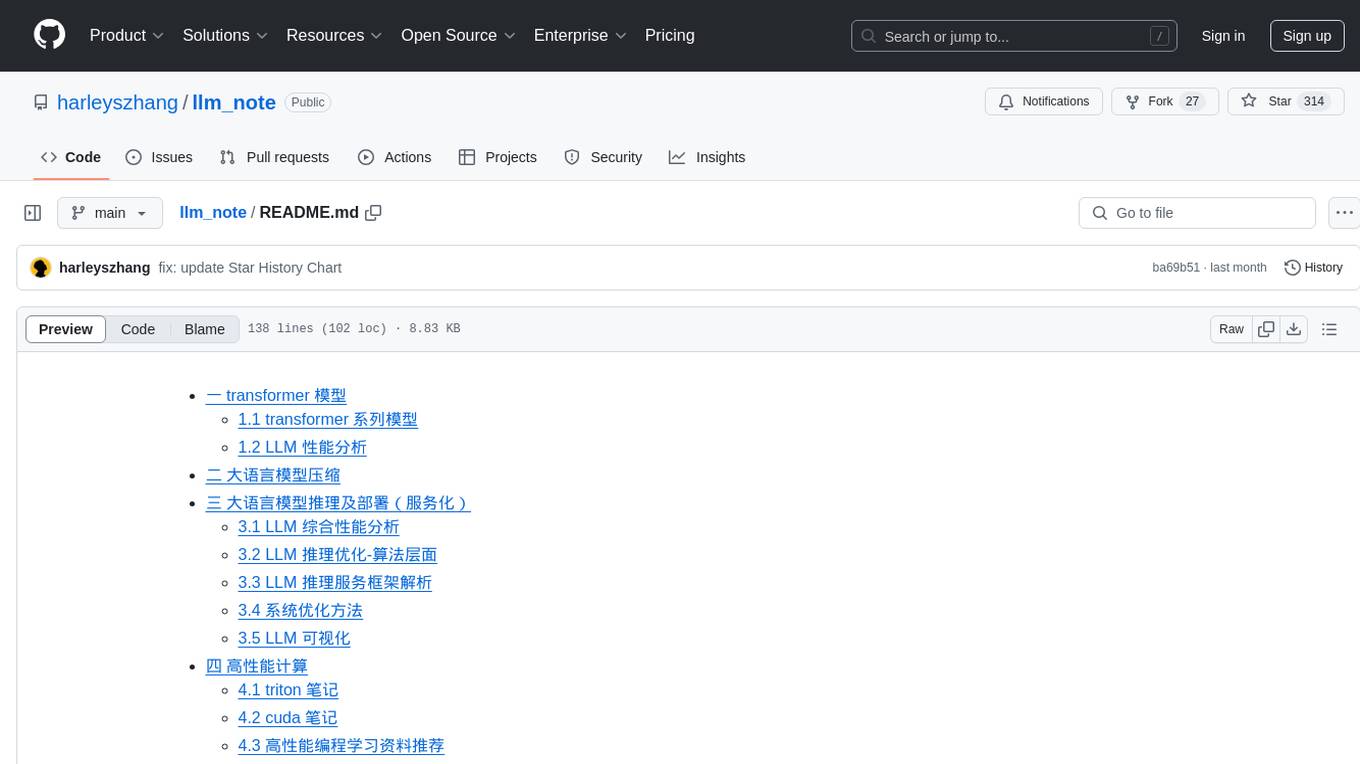
llm_note
LLM notes repository contains detailed analysis on transformer models, language model compression, inference and deployment, high-performance computing, and system optimization methods. It includes discussions on various algorithms, frameworks, and performance analysis related to large language models and high-performance computing. The repository serves as a comprehensive resource for understanding and optimizing language models and computing systems.
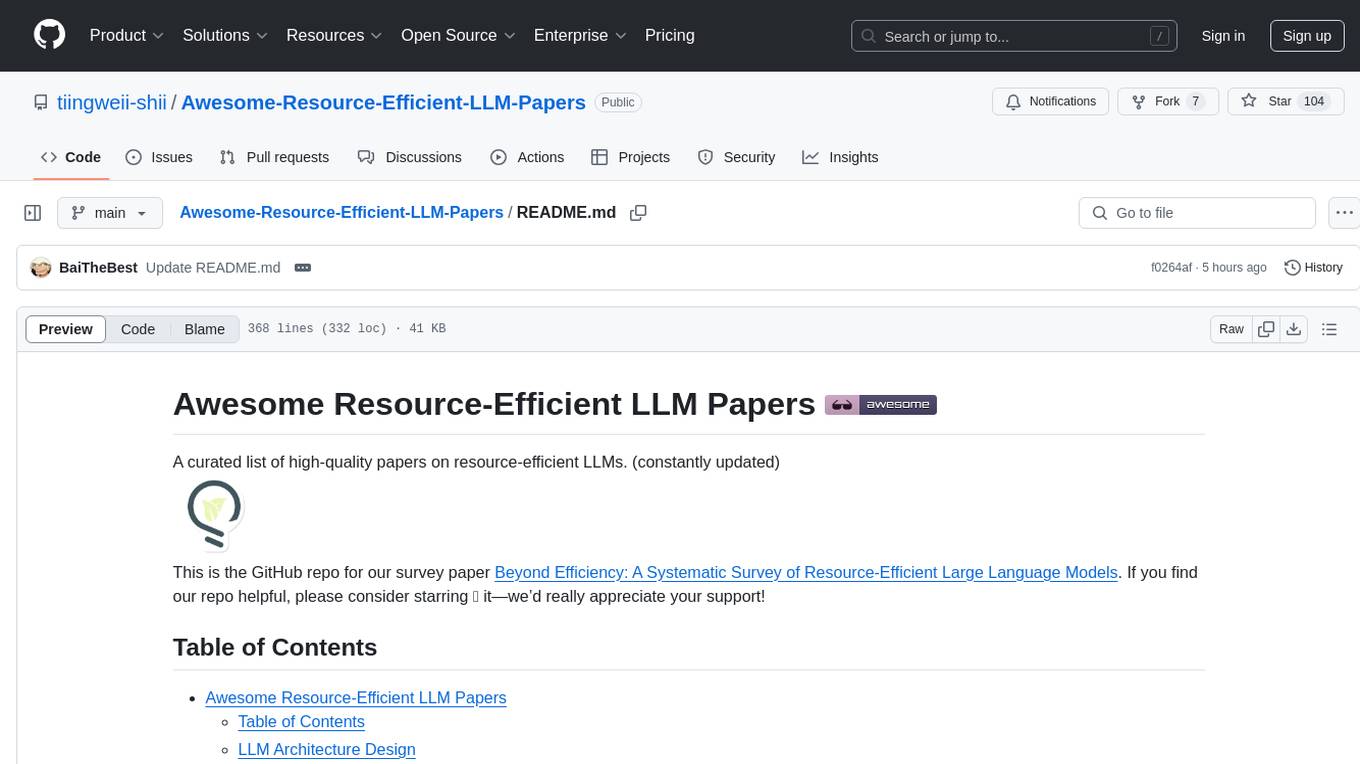
Awesome-Resource-Efficient-LLM-Papers
A curated list of high-quality papers on resource-efficient Large Language Models (LLMs) with a focus on various aspects such as architecture design, pre-training, fine-tuning, inference, system design, and evaluation metrics. The repository covers topics like efficient transformer architectures, non-transformer architectures, memory efficiency, data efficiency, model compression, dynamic acceleration, deployment optimization, support infrastructure, and other related systems. It also provides detailed information on computation metrics, memory metrics, energy metrics, financial cost metrics, network communication metrics, and other metrics relevant to resource-efficient LLMs. The repository includes benchmarks for evaluating the efficiency of NLP models and references for further reading.

